THE


THE

A family pursues justice 35 years after 14-year-old
Andre Roland’s death was quickly ruled a suicide. PAGE 14
THE REAL BUZZ ON CICADAS PAGE 5 ALL THAT COLUMBIA JAZZ PAGE 12 COMO COOKS UP COMMUNITY PAGE 20








































Even when you care deeply about an issue, it can be hard to take action. I grew up in settings where I was almost always in the minority. I was, and still am, accustomed to being among the few or only Black people in the room. As I got older, I became more in tune with my Blackness. With that maturity came feelings and emotions that I had to reckon with as an individual often overlooked.
Although I care deeply about my identity as a Black woman, it isn’t always easy to put myself out there and make my voice heard. Sometimes, it’s difficult to know how I should — especially when I’m the only one who can speak to my experiences.
In this issue, we see people who are outspoken not only in advocating for themselves, but also for others who have similar interests. In a climate where it can sometimes be difficult to make friends as an adult, the women behind the Columbia Women’s Social Group aim to create a space where women can come together and make connections (p.33).

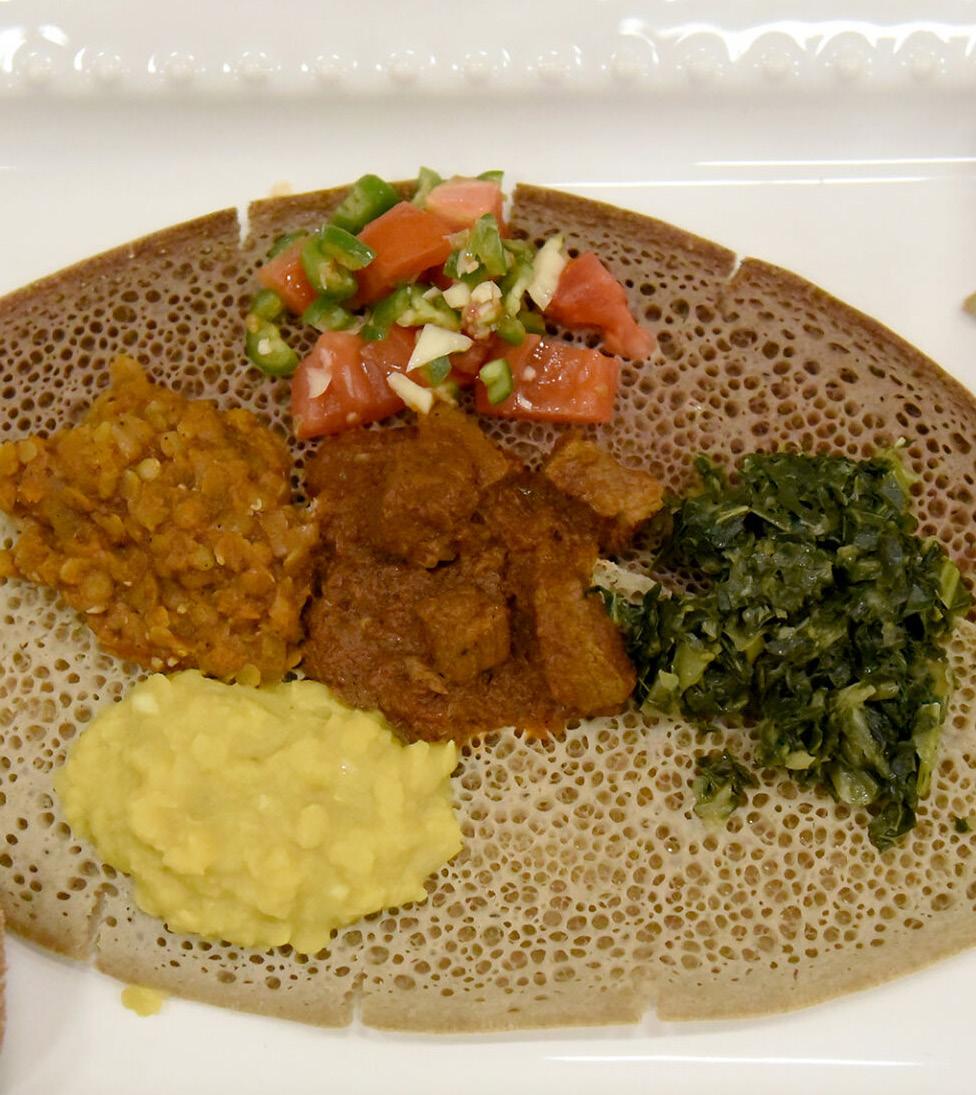
Recently, much of the Columbia community has been able to see the effects of activism — specifically related to the Israel-Hamas war. We get an in-depth look at five local activists from various backgrounds who are advocating for a cease-fire (p.34).
When mapping out this issue, a story that has been consistently on my mind is our feature about Christian Lewis, who is searching for answers about his brother Andre’s death, which was ruled a suicide in 1989 (p.14). I can’t deny that it was hard to read the details of this case, but I’m incredibly grateful that we were able to give a voice to a story about a young Black boy whose family believes he was the victim of an unjust investigation.
As I get older, I’m learning more about how to make my voice heard. One of those ways is through these letters, which I’m incredibly honored to have the opportunity to write. I’m also appreciative that I could read these stories and be inspired by these individuals. I hope you feel the same.

MICAH BARNES Editor-in-Chief
As Vox covers the food scene, we noticed a theme popping up again and again; more chefs using the CoMo Cooks Shared Kitchen, enriching the city’s cuisine. Since the shared kitchen moved to a larger space in March 2023, even more entrepreneurs have been able to bring their food to Columbia, whether that’s a father and his daughters cooking up Sully Sauce or a longtime home cook launching Abbey’s Swahili Delights. This month’s feature (p. 20) takes a behind-the-scenes look at how the operation works. By lowering the barriers for cooks to sell their products, the shared kitchen is a win-win. More cooks have opportunities to create businesses and Columbia gets great food! —Ian Wesselhoff
EDITOR-IN-CHIEF MICAH BARNES
MANAGING EDITOR MEGHAN LEE
DEPUTY EDITOR HOPE DAVIS
DIGITAL MANAGING EDITOR MJ MONTGOMERY
ASSISTANT DIGITAL MANAGING EDITOR MAE BRUCE
AUDIENCE ENGAGEMENT EDITOR DAVID TALLANT
CREATIVE DIRECTORS CAMPBELL BIEMILLER, AVA HORTON
PHOTO DIRECTOR LILY DOZIER
MULTIMEDIA EDITOR DOMINIQUE HODGE
ASSOCIATE EDITORS
CULTURE SOPHIE CHAPPELL, CHLOE LYKKEN, COLE MILLER, KHALIA SMITH, JULIA WILLIAMS
EAT + DRINK AVA GOUGH, JADEN HARPER, MOLLY RHODES, IAN WESSELHOFF, CAYLI YANAGIDA
CITY LIFE BETH BURTON, KARA ELLIS, EMILY ANNE GRIFFITH, ANDREA MERRITT
STAFF WRITERS SAM BARRETT, GRACE BURWELL, LEVI CASE, SARAH GOODSON, OLIVIA MAHL, ABBY RAMIREZ, SAVVY SLEEVAR
SOCIAL & AUDIENCE DIA GIBBS, MIKAYLA HIGGINS
DIGITAL PRODUCERS JACK COPELAND, EMILY BOYETT, BRIANNA DAVIS, SARAH GASSEL, AMELIA HURLEY, OLIVIA MAILLET, KATE RAMSEYER, SHIRIN REKADBAR-XAVIER, JACOB RICHEY, NATALIE SMITH, ABIGAIL ZORN
CONTRIBUTING WRITERS MADISON ARENAZ, ATHENA FOSLER-BRAZIL, KEARA CONNOLLY, MAYA DAWSON, AUDREY ELLIS, BRIANA IORDAN, OLIVIA MAILLET, MARY RUTH TAYLOR, NICOLE VOSS, ELLIE WEIEN
DESIGNERS CAITLIN KANE, GABBY NELSON, MAGGIE POLLARD
ART ASSISTANTS THEO JOHNSON, VALERIE TISCARENO
EDITORIAL DIRECTOR HEATHER ISHERWOOD
EXECUTIVE EDITOR LAURA HECK
WRITING COACHES CARY LITTLEJOHN, JENNIFER ROWE
FOLLOW US

WANT TO BE IN-THE-KNOW?
Sign up to receive Vox ’s weekly newsletter, the “Vox Insider.” We’ll tell you how to fill up your weekend social calendar and keep ahead of the trends. Sign up at voxmagazine.com.

CALENDAR send to vox@missouri.edu or submit via online form at voxmagazine.com
JUNE 2024 VOLUME 26, ISSUE 5
PUBLISHED BY THE COLUMBIA MISSOURIAN LEE HILLS HALL, COLUMBIA MO 65211
Cover design: Caitlin Kane
Photography: Halle Paulus
Unearthing the truth
Experts answer questions about the cicada broods emerging this summer.
Join in on some early summer fun with art festivals, a new restaurant and more.
Digging into our past
Professor Libby Cowgill finds connections between anthropology and fitness.
It’s a novel idea
Sabreena Anowar explains what it took to open her book store, Sabu’s Books.
Rock ’n’ records
Since 2020, B Side Records has prided itself on its varied selection of music.
Hitting all the right notes
Join the jazz scene with local artists and the “We Always Swing” Jazz Series.
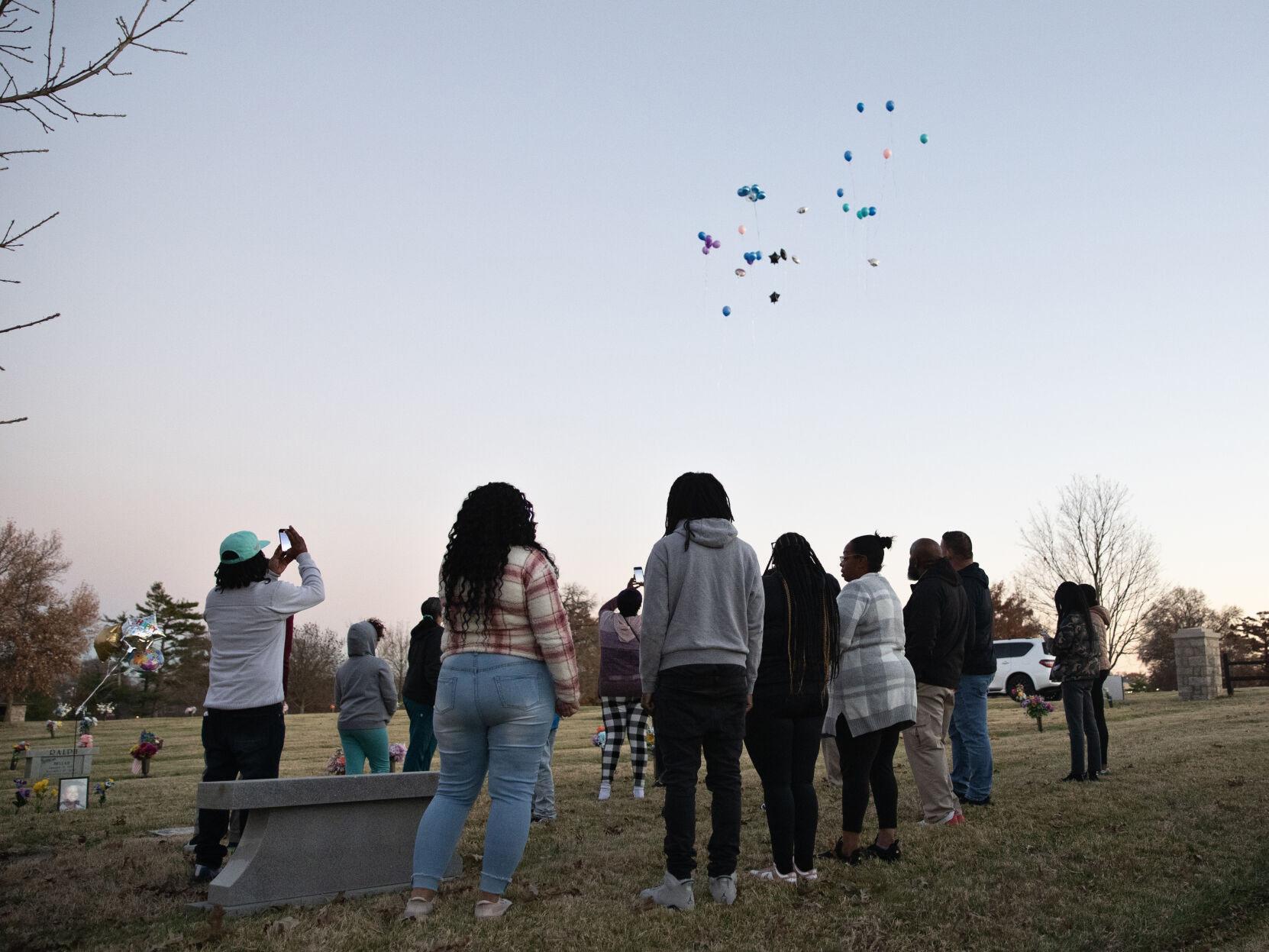
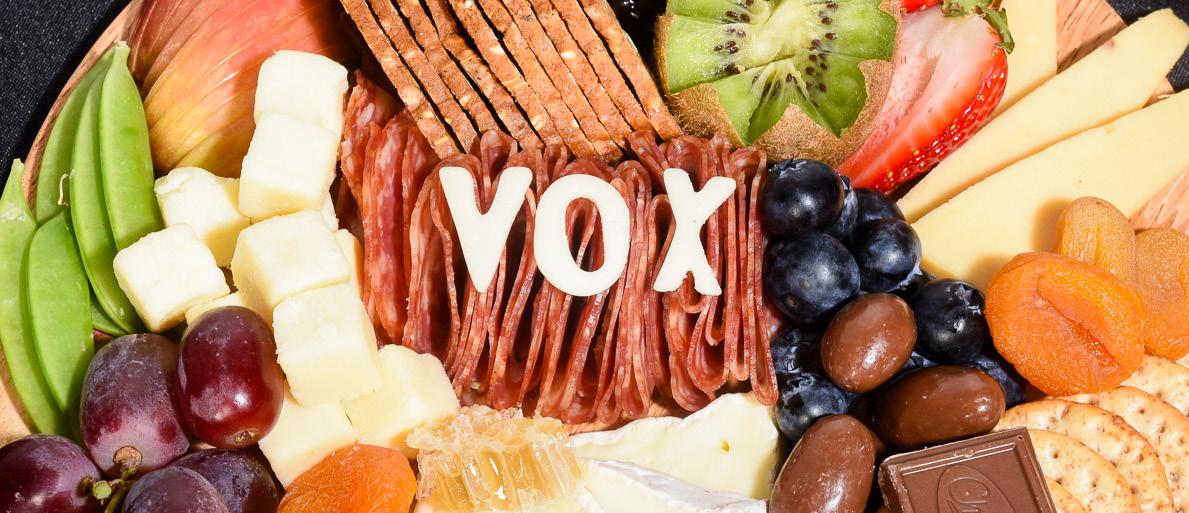
Andre Roland’s family searches for answers 35 years after his death.
CoMo Cooks Shared Kitchen serves up support, jumpstarting small businesses.

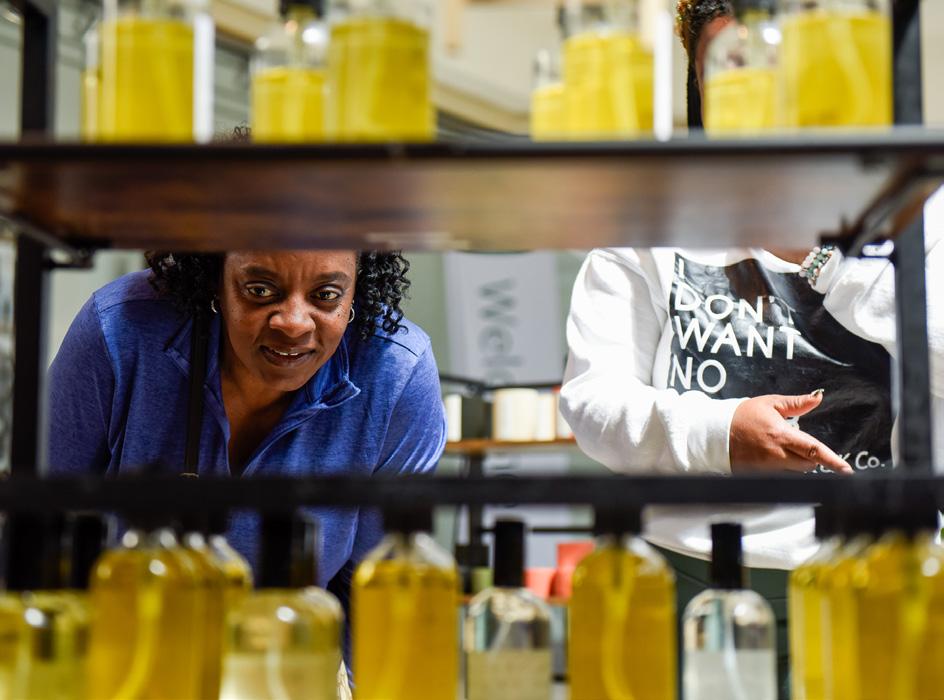

As the charcuterie trend grows, Abby Hillman began a business in her dorm.
Thirsty? Dive into five women-owned bars and their impact on the community.
Mya McClain’s business pops its way to success through community connection.
Get a whiff of this CoMo Vibes and K&K Co. bring homemade candles to Columbia.
This community group provides support and friendship for women of all ages.
Meet local activists advocating for peace as the Israel-Hamas war continues.





As boisterous broods of cicadas emerge this summer, common misconceptions still persist.
BY BRIANA IORDAN
Cicadas might be the most misunderstood insect. And unless you’ve been living underground, you likely know that we’re set to see a lot more of them this summer.
While annual cicadas create a background buzz every year, 2024 marks the emergence of two groups of periodical cicadas. The Great Southern Brood XIX, emerges every 13 years, while the Northern Illinois Brood XIII emerges every 17 years. After spending most of their lives underground, these cicadas surface for four to six weeks with two goals in mind: to mate and lay eggs. The adults then die and the new nymphs burrow underground to begin the cycle again.
Annual cicadas are larger than periodical cicadas, which
Are cicadas to blame for the holes in your tomatoes or 100-decibel sounds in your backyard? Find out what’s true and what’s false.
have red eyes and orange-veined transparent wings. They’re also louder. The various annual cicada species have a life cycle of two to five years, which is why mature ones emerge every summer.
To sort out the facts from the fiction, Vox spoke with three local cicada experts: Tamra Reall of the University of Missouri Extension, Rex Cocroft, a MU professor of biological science, and MU postdoctoral fellow Allison Roth.

MYTH: Cicadas are locusts.
Fact: Cicadas and locusts are like night and day. Locusts are grasshoppers known for swarming and causing crop damage. Locusts’ life cycles are about eight to 10 weeks.

MYTH: This summer will be a cicada
Fact: While this summer marks the first time since 1803 the two broods have emerged in the same year, the species cover slightly different areas. Brood XIX emerges in Missouri, southern Illinois and continues southeast, while Brood XIII surfaces from central to northern Illinois reaching parts of southern Wisconsin and east Iowa. They’ll also be out at slightly different times, with the southern cicadas starting in early May and the northern ones in mid to late May.
There will be some areas of overlap (hello, Springfield, Illinois!), but most people will experience only one periodical brood.
MYTH: Cicadas eat your garden.
Fact: Don’t blame cicadas for the bug damage in your garden. These insects don’t eat garden plants. They feed on
sap. A cicada’s mouth is like a hypodermic needle, built to suck sap from the roots of woody plants, mostly trees.
Mature trees are able to weather damage easily, but you might want to cover saplings with fine netting such as cheesecloth, Reall says. This prevents the females from laying eggs there, which may harm young trees.
MYTH: Cicadas can harm your pets.
Fact: Unlike bees or ants, cicadas don’t sting or bite. Cicadas are also edible — for pets and people. “As long as (pets) don’t eat too many, they should be fine,” Reall says.
MYTH: Cicadas make noise by rubbing their wings together.
Fact: Cicadas have a special organ called a tymbal. Male cicadas use their tymbal like a cymbal to create noisy rhythms and attract mates. Female cicadas re spond by flicking their wings. Roth says these chorusing songs and elaborate courtships create complex duets.
Reall says when male cicadas sing in synchrony, it can generate sounds as loud
To learn more about cicadas, check out entomologist and University of Missouri Extension agent Tamra Reall’s column “Kids Ask Dr. Bug.” Find it in Kansas City Gardener, kcgmag.com, or see the animated version on YouTube, youtube.com/@ MUExtensionBug
as 100 decibels, which is comparable to a lawn mower or chainsaw.
MYTH: Periodical cicadas serve no purpose.
Fact: The mass emergence of cicadas is like a wildlife buffet. It’s a huge boost to the food chain, helping other animals survive. “They are a really huge influence on the environment, even though they are only coming about every 13 or 17 years,” Roth says. Emerging infrequently en masse also serves a purpose. While it’s not fully understood, it’s believed this behavior helps the species survive.

Periodical cicadas also give us an opportunity to interact with nature in our own backyards. “Periodical cicadas are one of the biological wonders of North America,” Cocroft says. “It really is a magnificent spectacle.”
While their noise, prolific appearance and leftover exoskeletons can be bothersome, cicadas are inherently harmless critters. “If you actually take a second to look at their teensy little squashed up faces, they are pretty cute,” Roth says.

SIP on an herbal tea from Wynnsome, a new tea shop in the heart of downtown. With an assortment of artisanal teas, locally roasted coffees and handcrafted cakes, there are a variety of items to enjoy. Patrons can also order custom cakes or rent out the space. Open noon to 8 p.m. Wednesday through Saturday, 1020 E. Broadway,




through the purple fields of Battlefield Lavender this summer. With no admission fee and harvesting supplies provided, guests can roam the fields, feed chickens, buy crafts from vendors and enjoy ice cream. The local boutique will also be selling lavender products. The fields, which boast 16 varieties of lavender and over 2,400 plants, are expected to be in bloom from about June 1 to 17 this year. Open 10 a.m. to 6 p.m. every day, 20601 N. Rangeline Road, Centralia, 573-227-2242,
Juneteenth in Cosmo Park. This event — which marks the day federal troops arrived in Galveston, Texas, in 1865 to emancipate enslaved people — will be Columbia’s fifth annual Juneteenth festival hosted by The Village, a local organization focused on uplifting Black communities. Guests will have the opportunity to learn about the origins of Juneteenth and the true emancipation of Black people, while also enjoying a day of fun with music, live performances, food and vendors. June 19, noon to 7 p.m., Cosmo Park, visitcolumbiamo.com/ juneteenth/2024
Libby Cowgill is an anthropologist who combines her love for physical activity with the study of human biological history.
BY ABIGAIL ZORN
Libby Cowgill defines anthropology simply: it’s the study of humans. Cowgill is a biological anthropologist and associate professor at the University of Missouri. She has spent much of her career studying Neanderthals and early modern humans. Along the way, she found the relationships between human biological responses to exercise and climate fascinating.
Cowgill’s love for anthropology started at an early age — her parents kept animal skulls in their china cabinets — and continued throughout her college years. In addition to anthropology, Cowgill teaches CrossFit classes. Many of her studies related to exercise and bones are intertwined with her daily life.
For an episode of the Vox Voice podcast, Cowgill talked about the inspiration and passion behind her anthropological studies.
Why did you choose anthropology?
While I was growing up, my parents — who are not anthropologists — thought skulls were amazing. And so whenever we would be out walking around or hiking, they would find skulls on the ground and they would bring them back. Most people have cabinets full of china in their living room. At last count, we have 92 different animal skulls in my living room, all in china cabinets, all with cool little labels with their binomial nomenclature, their genus and their species name underneath them. My earliest memories of spending time with my father are sawing off the head of a rotting sea lion on a beach.
So, when I got to college, I’m like, “Bones are really neat. What type of classes can I take that kind of tie into osteology, which is the study of bone?”
I took an Introduction to Biological Anthropology class and it was all downhill from there.
What fascinates you about the field?
My initial focus when I was going through grad school was Neanderthals. They are about as close to being a modern human as you can get without being a modern human. They did all sorts of things that were similar to us. They hunted, they lived in groups. They also were not like us. They didn’t really make a whole lot of art. That juxtaposition that’s so close to us, but not quite us, was always really fascinating for me.
How does exercise science fit in?
Your bones are basically just like your muscles. If you do a whole bunch of physical activity, your body lays down more bone to resist the stress that puts on your body. And if you lay on a couch and are a giant couch potato your whole life, your body takes away bone. You can basically look at skeletons in the past and draw conclusions about what they were doing with their lives. It’s one of the main techniques that we use in archaeology and paleontology to reconstruct what people and other organisms did when they were alive.
What other aspects of the research interest you?
I have this whole avenue of my research that’s studying
The ninth season of the Vox Voice podcast, including Libby Cowgill, is available wherever you listen to podcasts.
how bone responds to exercise throughout the lifespan, so I’ve looked at other groups of organisms other than Neanderthals. But I also got really interested in how people survive in extreme cold and extreme heat because Neanderthals were people that were living in glacial Europe. (My collegues and I) have what’s called a climate chamber, where I take people every summer and I put them in a very cold room, a very hot, etc. What we’re trying to figure out is if certain body shapes do better in certain climates.
What can we learn about fitness through anthropology?
Libby Cowgill combines her passion for studying bones with exercise by teaching CrossFit classes. Her current class is for ages 60 and older, focusing on how to safely exercise and maintain strength.
We know that physical activity — and this comes from studying anthropology — tends to really, really improve the way that you age. So when we look at hunters and gatherers or other extremely active populations across the globe, they don’t. They live almost as long as we do, but what they don’t seem to have is this period of sickness and frailty towards the end of their lives. Just anthropology in general has informed, quite strongly, how I think about aging and how I think about what I want my future to look like.
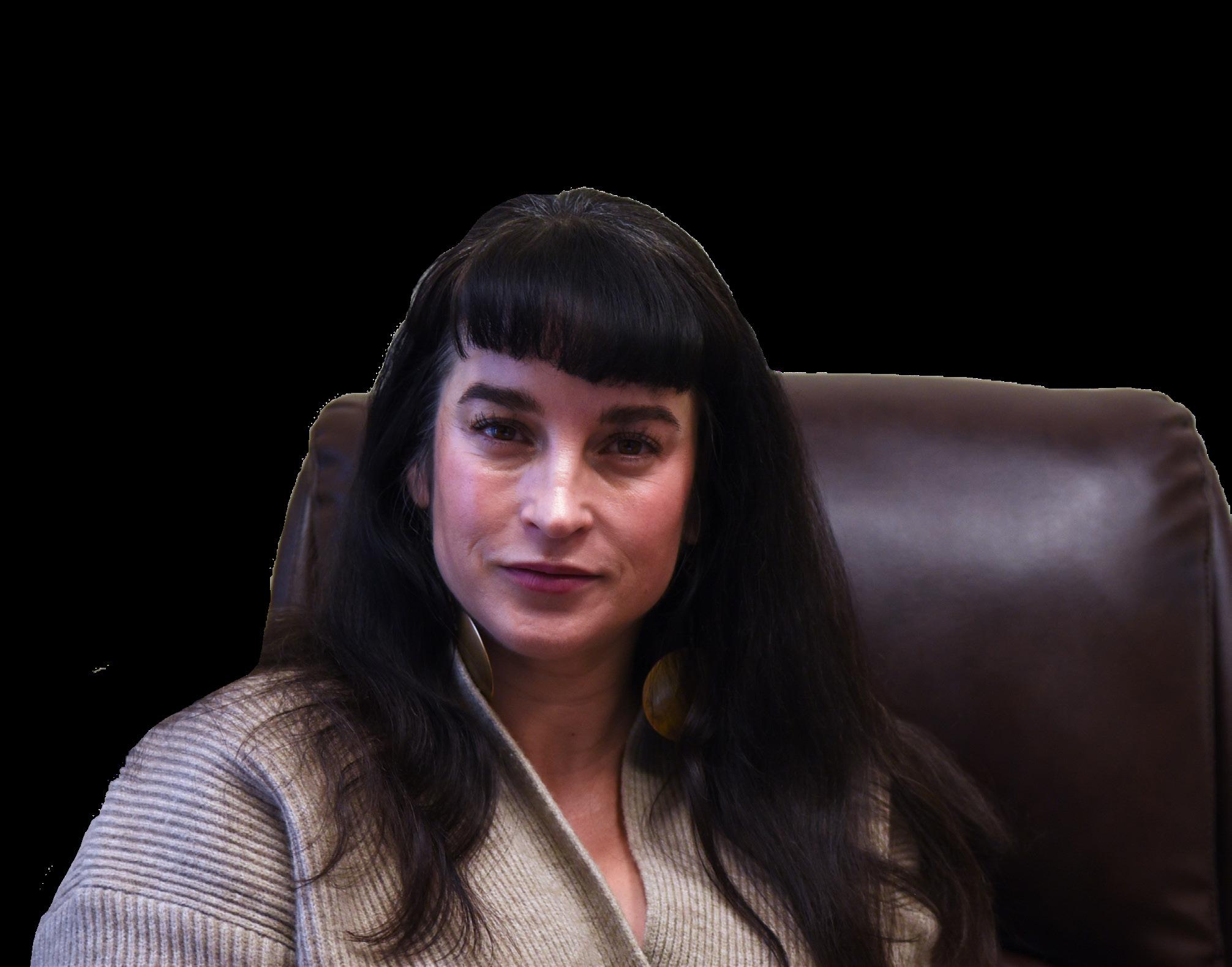
Photography by Abigail Zorn



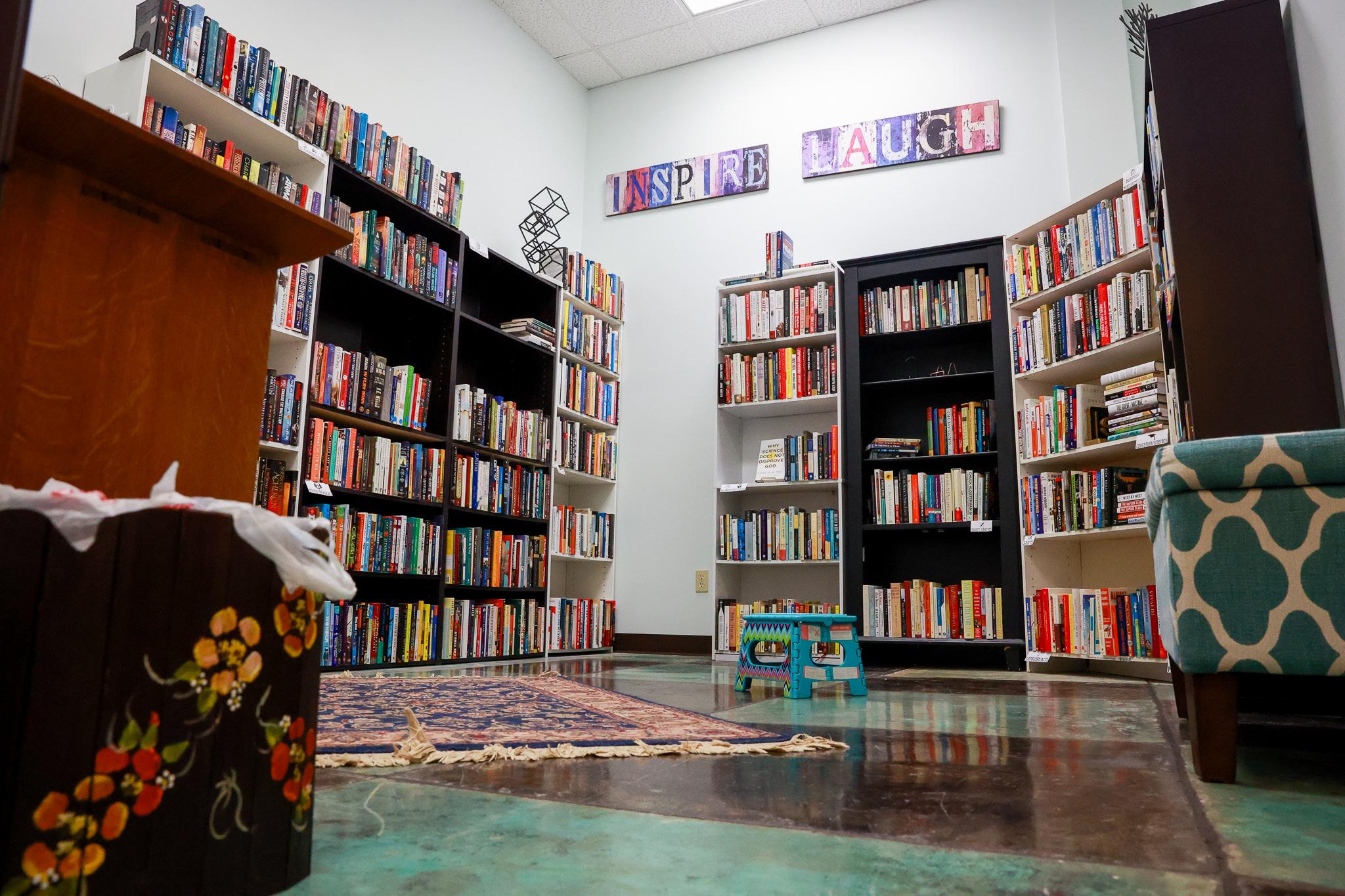
Be her guest — Sabreena Anowar made her fairytale dream of owning a bookstore come true.
BY SARAH GOODSON
Growing up, Sabreena Anowar dreamed of floor-to-ceiling bookshelves like what she saw in Beauty and the Beast. She made that dream a reality when she opened Sabu’s Books in February.
Anowar spent many years traveling around the world for work. During that
time, she says taking boxes of books with her wasn’t practical.
In 2019, Anowar accepted a job at the University of Missouri as an assistant professor of civil engineering. This motivated her to finally start curating a large book collection. During the pandemic, she began buying books and got the idea to start a bookstore. The name Sabu’s comes from her nickname during her undergrad studies in Bangladesh. At first, it was going to be an in-home bookstore, but with limited room due to her book piles, that was out of the picture. That eventually became the idea to open a shop of used books.
Anowar says she wanted to bring back the nostalgia of printed books in the digital age. She and her business partner, Janene Hillbrick, opened Sabu’s
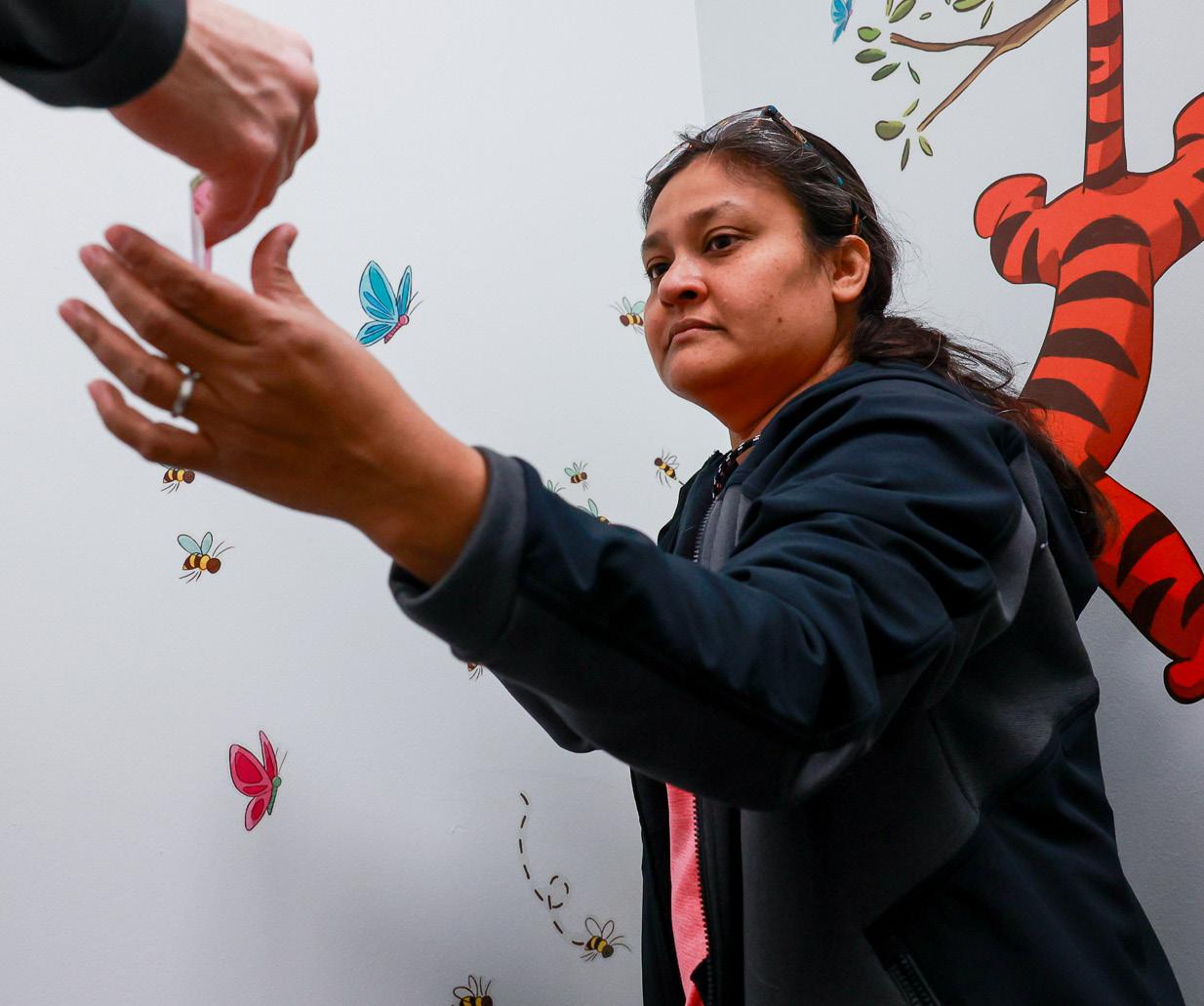
One of Sabu’s Books’ rooms (above left) is filled with a variety of genres. Sabreena Anowar (above right), co-owner of Sabu’s Books, decorates the children’s book room. The Winnie the Pooh theme appears throughout the bookstore.
with the hopes of learning and relaxing together. “Pick a book, sit here, listen to the music, have a coffee and read the book,” Anowar says. “It’s kind of like a passion project.”
When you walk through the door of Sabu’s, you’ll be greeted by two smiles and a furry face. Anowar and Hillbrick, of course, and on a little black stool is Rama the cat, the store’s official mascot. Sabu’s Books is located next to Hillbrick’s business — Sun Structural Massage studio. Anowar and Hillbrick say they weren’t actively looking for a space for their own bookstore, but when the space
opened up, they nabbed it. The two had an idea for something new: a massage school and bookstore combined.
“If we have a lecture here, then it would be an interesting concept,” Anowar says. “Getting a massage while listening to an audiobook or something like that.”
Although Hillbrick owns the massage studio, the idea of opening a massage school is something she’d been thinking about for almost 10 years. With an empty space on the left and a massage studio on the right — and a ton of books — the two decided to turn the empty space into a bookstore. They say they currently are waiting on approval for the massage school and hope it’s approved by summer.
“When the people who were in here moved out, it just seemed like it would be a good fit to open up the hallway in between the two businesses and be able to expand out into the side,” Hillbrick says.
Throughout the bookstore maze, there are multiple rooms with different genres, Anowar says. With around 3,500 books,
each small room is piled high, creating a comfortable reading atmosphere.
The main room, which Anowar calls the nerdy room, is filled with anything and everything nonfiction: gently used history, science, self-help, psychology and mental health books. The second room is filled with fiction books. The third is called the hybrid room and is stacked with more niche genres.
The rooms are still being updated, and Anowar says they still have over 5,000 books packed away in boxes. The children’s room is the last room the owners plan to open. The Winnie the Poohthemed room was scheduled to open May 14 during the bookstore’s grand opening.
Members of the community have helped Anowar and Hillbrick’s journey. Connie Edwards met them both at Bethel Baptist Church a few years ago. Edwards says she’s always been a big reader and book collector and needed to get rid of books. In helping her friends out and decluttering, Edwards donated some to Sabu’s.
for our State Summer Games May 31 - June 2, 2024
Come out and enjoy our Opening Ceremony at 7:00 p.m. at the MIZZOU Rec and to volunteer and cheer on our athletes.
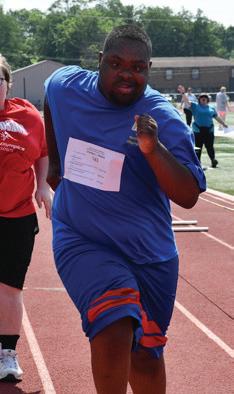
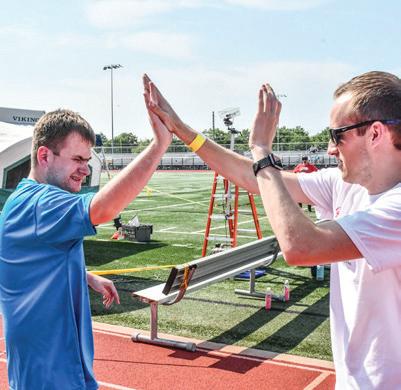

Sabu’s Books is located at 4603
John Garry Drive, Suite 12. It’s open Monday to Thursday from noon to 7 p.m., Fridays from noon to 6 p.m. and Saturday and Sunday from 11 a.m. to 5 p.m. Sabu’s Books also sells audiobooks via libro.fm or buy books online at sabusbooks.com.
“(Anowar is) so crazy about it,” Edwards says. “This was her dream to have a bookstore and anybody that can fulfill their dream, I think that’s wonderful.”
Once the bookstore gets busy enough, they’ll hire more employees. For now, Hillbrick’s niece, Hannah Gaines, is an intern at the store. She is a senior at Rock Bridge High School and says she has always wanted to work in a bookstore.
Gaines says she loves the location and accessibility of the bookstore, which is near her school rather than downtown. She says she hopes that more people will find out about the shop.
“It’s really close to Rock Bridge High School, which I think is super cool,” Gaines says. “I’ve told a bunch of my teachers about it, and they’re like, ‘I’m gonna go and I’m gonna support them.’ ”
In the future, the owners say they hope to be involved with more events, like book clubs or a reading hour held in collaboration with Columbia Public Schools.

Looking for some new jams or a graphic tee? At B Side Records, you’ll find both vinyl and merch.
BY OLIVIA MAILLET
Four years ago, as he drove in for B Side Records’ opening day, owner Matt Marshall didn’t see a single car on the road. The store unlocked its doors for the first time in March 2020 — just as the COVID-19 lockdowns began. “We staffed up the whole place and immediately everyone was fired,” Marshall says.
In those early days, online sales kept the store afloat. “The merchandise and vinyl records sold like a rocket,” Marshall says. Today, B Side maintains a consistent online presence, but has also flourished into a bustling storefront.
Track 1 - Work Around the Clock
Marshall has lived in Columbia his entire life. He kickstarted his online merchandising business, Bluescentric, while attending Columbia College and later opened a store in the Arcade District. When Chris Parker visited him there, the two quickly bonded over their shared love for music and gigantic record collections.
The record store began as a showroom for Bluescentric’s merchandise

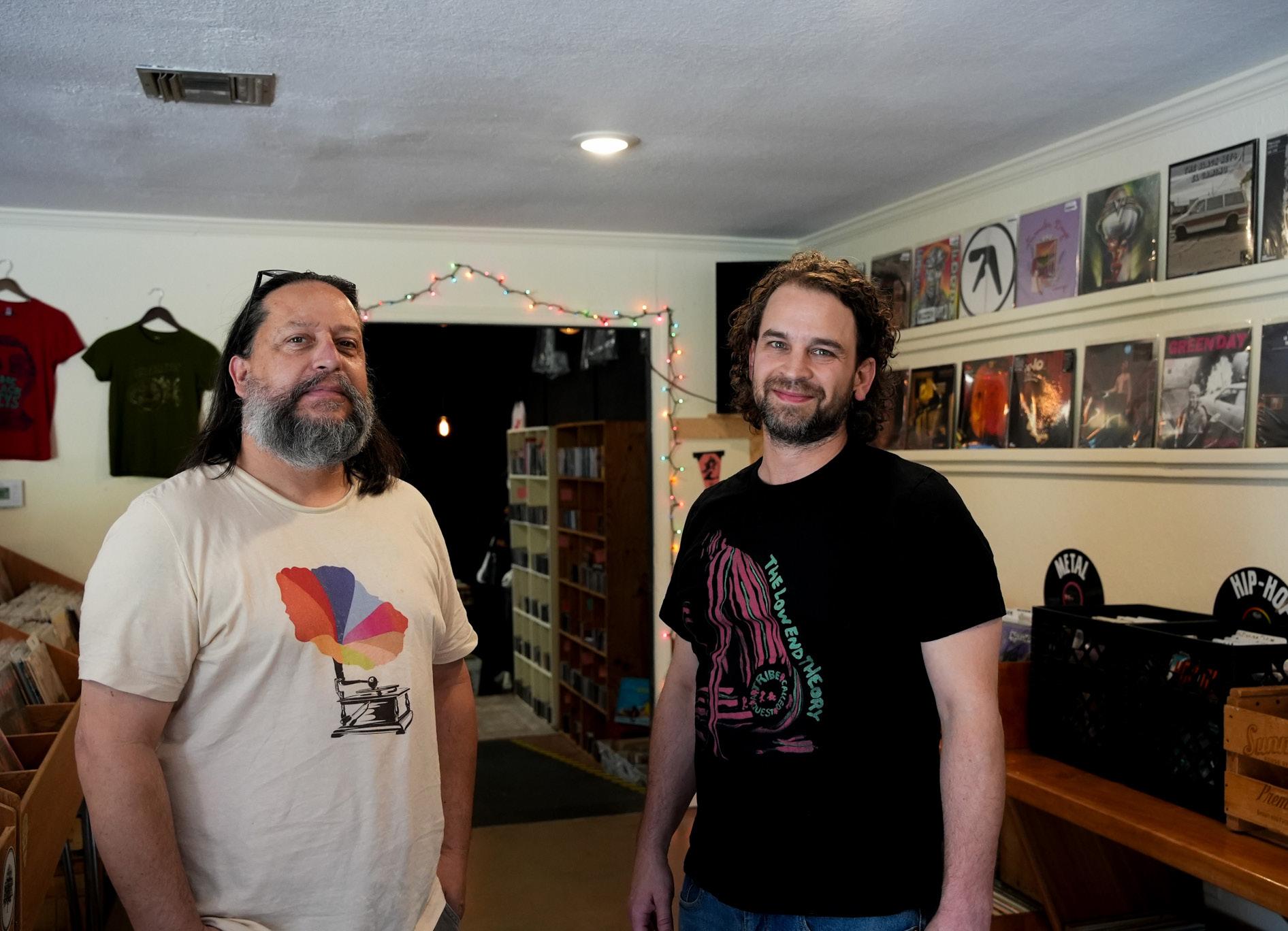
B Side Records owners Chris Parker (left) and Matt Marshall are both Columbia natives. They often reminisce about what they call their days of “Ninth Street record hopping.”
Find B-Side Records in the Arcade District at 601 N. College Ave. Monday through Saturday 12-6 p.m., closed Sundays or bluescentric.com.
and a place to sell their own record collections. Marshall started B Side solo, but Parker joined him as co-owner shortly after its opening.
Inside the shop, colorful paintings and band T-shirts adorn the walls. There are racks upon racks of merchandise — including the original work of Bluescentric. Tables display a range of records from Iron Maiden to Taylor Swift.

Track 3 - Born to be Owners
Parker says it was his dream to run a record store, so he eventually parted ways with Bluescentric to focus on B Side Records full time. Parker is now the manager of the record store, while Marshall manages administrative elements related to both businesses.
Marshall and Parker say they like the open feel and funkiness of their shop --- including that it’s a stone’s throw away from Rose Music Hall.
Marshall and Parker say they enjoy the open feel and funkiness of the building, as well as its close proximity to Rose Music Hall, the arcade and comic book store.
Track 2 - Sweet Records of Mine
Marshall and Parker still have the first records they purchased as kids. Parker’s is Queen’s Greatest Hits; for Marshall it’s Lynyrd Skynyrd’s Gold and Platinum.
That same respect for physical albums extends to the store’s customers and its employees. “There’s something about physically having (an album) in your hands like you would have a friend around physically,” says Bella Dablemont, a B Side Records clerk and Bluescentric artist.
B Side Records sells new and used vinyl, and also buys used vinyl records from customers.
Parker and Marshall say they pride themselves on serving vinyl collectors and the greater Columbia community. They want the records they sell to cover all spheres of music.
“We have an ethos here of extreme inclusivity in music,” Marshall says. “We like to say all music is good music. It’s a subjective thing.” For Marshall, the best way to know what music fans are into is by hearing it straight from those who are out and about.
With B Side Records, Marshall says he aims to continue making music an attraction in the Arcade District. The store has a stage in the back, which is open for community use. They want to provide a space for local musicians who want to play.
The employees joke that the Bluescentric merchandise store is the A side of the business and the showroom is the B side. Together, they make a complete set for their customers.
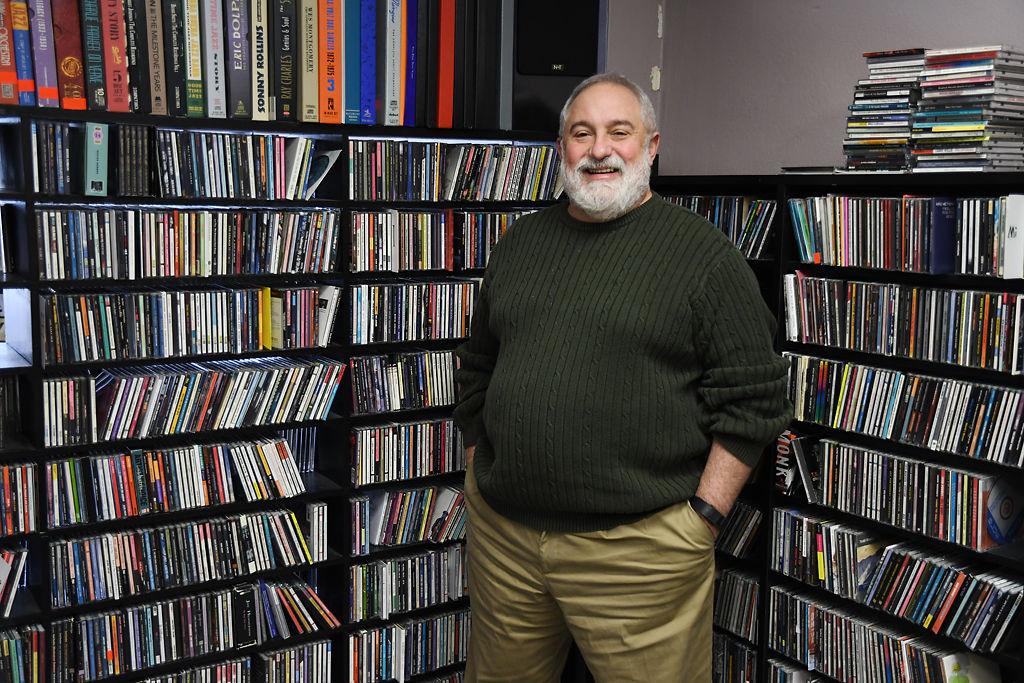
Columbia musicians and enthusiasts keep the culture of jazz alive with performances, creativity and passion for the genre.
BY GRACE BURWELL
On Saturday evenings at Murry’s restaurant, house drummer Troy Hall sets the pace for the tunes. A music and philosophy professor at the University of Missouri, Hall makes up one-third of the Tom Andes Trio.
He says he considers himself a modern jazz drummer — concentrating on improvisational bebop. The musicians bounce off one another so well that it gives the illusion there are more than three people on stage.
Hall has been drumming at Murry’s for 15 years and says he loves the freedom jazz offers. When he’s playing the drums, Hall says he doesn’t have to think about anything else. “It just totalizes your consciousness,” he says.
Jazz can be all-consuming and challenging to dive into if you’re not familiar with the genre. Luckily, there are a multitude of local listening opportunities for those interested in expanding their jazz vernacular. Whether you’re a seasoned listener or starting from scratch, here’s
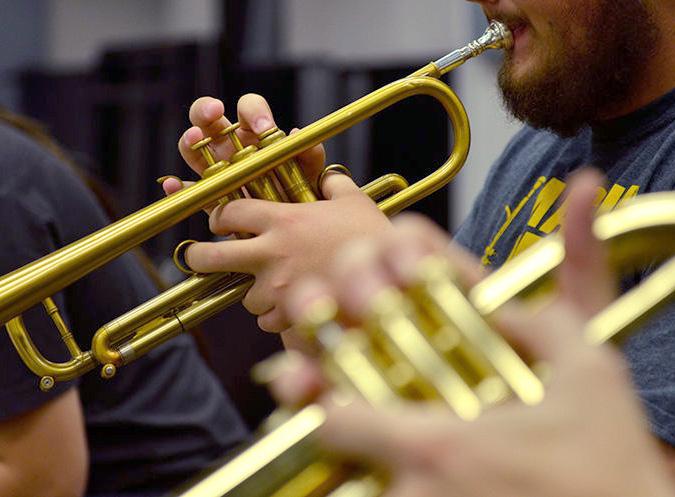
what you need to know about the tempo of Columbia’s jazz scene.
The 18-piece Columbia Jazz Orchestra (including trumpets, above) incorporates different sounds into the group’s performances.
The first notes of jazz music in the U.S. originated in Black communities in New Orleans during the early 20th century. As jazz evolved, so did its countless unique styles like swing, bebop, hard bop and Latin jazz, among others — all with varying musical influences.
“When you talk about jazz, you’re talking about a world, a social context,”

Hall says. “Not just a body of music, but a way of playing music.”
Nathaniel Ferguson, an adjunct jazz studies professor at the University of Missouri, says he loves jazz for the experience of listening, playing and the history encompassing it. Ferguson is a saxophonist for the Columbia Jazz Orchestra — an 18-piece band, that performs the last Monday of every month at Broadway Brewery.
“It does such a good job of telling the country’s story and I love that about the music,” Ferguson says. “The history of it tells the story of how this country has come to be what it is.”
Ferguson recommends new listeners immerse themselves in jazz as much as possible. “There’s so many different genres that I would go by decade,” Ferguson says. “I guarantee you’ll find something that you really, really like.”
For jazz musicians in Columbia, there aren’t many places to break into the business. Fortunately for listeners, there’s no shortage of exciting performances in town.
The “We Always Swing” Jazz Series, founded in 1995 by Jon W. Poses, puts on multiple jazz events and performances in Columbia every year. The organization brings in artists from around the country, such as New York’s Maria Schneider and Arturo O’Farrill.
Ferguson, who has played in the Columbia Jazz Orchestra since summer 2023, says he hopes the organization will continue to expand its reach. “There’s a really strong community that comes out to support the local jazz musicians in town,” Ferguson says. “We want to try to integrate the student musicians with that community a little more.”
Sam Griffith is the director of jazz studies at the University of Missouri. He teaches a variety of courses, including Kansas City Jazz and Gangsters. Griffith also directs the university’s concert and studio jazz bands along with several jazz combo groups.
“I think the draw for a lot of musicians is the combination of community and also the unknown,” Griffith says.
Columbia has many local groups that share their passion for jazz. All of the events are free.
Listen to the Columbia Jazz Orchestra perform the last Monday of every month at Broadway Brewery, 816 E. Broadway, from 7:30 to 9:30 p.m.
Catch the Tom Andes Trio at Murry’s, 3107 Green Meadows Way, every Saturday from 9 to 11:30 p.m.
Pop into 21 N. Tenth St. to peruse and listen to the “We Always Swing” Jazz Series’ catalog collection of over 9,300 jazz CDs.
Come support your Tigers in MU’s School of Music Concert Jazz Band for its upcoming 2024 performances. Find information at music.missouri. edu.
University of Missouri sophomore Olin Guillotte says he enjoys the focus on artistry and communication jazz brings. Guillotte, who is studying psychological sciences, is a drummer in the university’s concert jazz band and has been playing for nearly six years.
“The back-and-forth between the different instruments can be amazing and it’s so complex, so it’s new every time,” Guillotte says. “It’s like a breath of fresh air.”
Hall says his job as a jazz musician is to establish positive energy for the audience and play at the highest level possible. “You serve the music first,” he says. “It’s about the music, and you serve the music by playing it as well as you can and with as much honesty and conviction as you possibly can.”
Many musicians and connoisseurs agree the most important element to learning more about jazz is simple: listen. “Jazz is about stretching your ears, and the more you listen to it, the more it makes
sense,” Jon Poses says.
While musical genres like pop or rock offer nostalgia and lyrical familiarity, jazz is constantly reinventing itself in real time. Improvisation is a key component of jazz performances, and each one is a unique, non-repeatable event, Hall says. While some might find its improvisational style intimidating or unapproachable, that element of surprise is why many remain deeply passionate about jazz music.
“It’s this lost art of being able to, in a moment’s notice, put together a live music experience that’s enriching for whoever is listening,” Ferguson says.
For those interested in learning to play jazz, Ferguson recommends taking private lessons through a music education organization such as Compass Inc. Just picking up an instrument and learning the basics is a good start, Ferguson says.
“You can just never have enough knowledge and you can never have enough experience,” Ferguson says. “So broaden your horizons, and always try to (learn more). It’s a wonderful tool to have in your toolbox.”
Drummer Troy Hall makes up one-third of the Tom Andes Trio. He plays using improvisational techniques and enjoys the creative freedom of jazz.
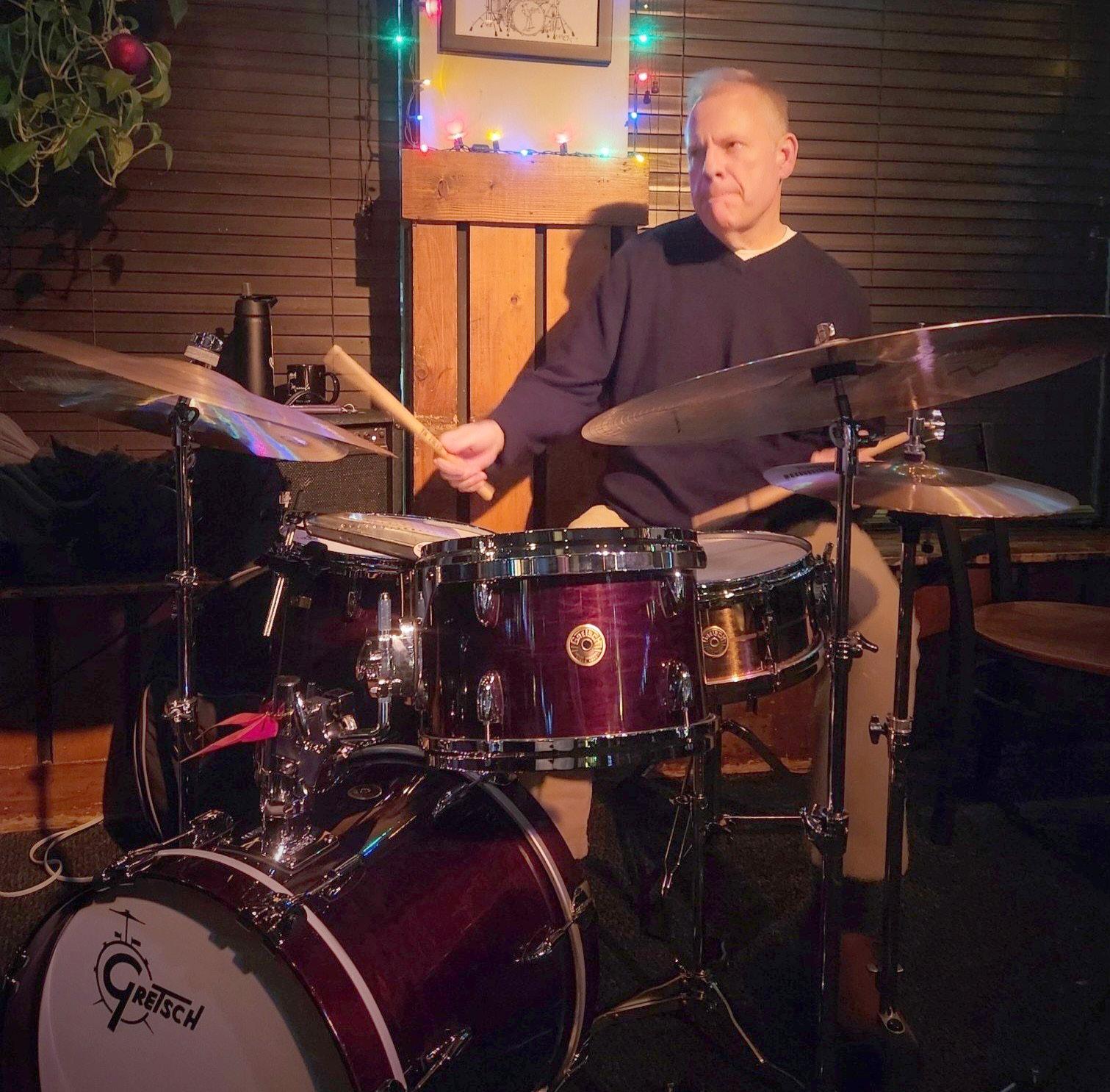

In 1989,14-year-old Andre Roland’s death was ruled a suicide. Concerns about the speed of the investigation and lingering questions have led his brother to continue to push for justice.

Christian Lewis, Andre Roland’s younger brother, releases balloons in Andre’s memory in November. “This one’s for you, ‘Dre,” Christian said.

P“Please, please, please,” Christian Lewis, 11, begs his 14-year-old brother, Andre Roland. It’s March 24, 1989, and Christian wants to play basketball down the street. “No,” Andre says repeatedly. The two are scheduled to play a basketball game later that day at their church, Progressive Baptist.
His brother’s response doesn’t stop Christian; he continues pleading.
Andre finally gives in, even though he knows they aren’t supposed to leave before their mother gets home from work. By that time, Christian has to use the bathroom, so he tells Andre he will meet him there.
About five minutes later, around 3:30 or 4 p.m., Christian strolls to the basketball
goal. He notices the neighborhood is silent. When Christian arrives, Andre is nowhere to be seen. Christian shouts his name. Pause. He shouts again. And again. There is no reply. Just silence.
At 5:30 p.m., a Clearview subdivision neighbor finds Andre hanging by his belt from a small, low tree branch near 472 E. Hackberry Blvd., only a few hundred feet from the basketball hoop where the brothers were supposed to meet up.
There are no marks on his body to indicate foul play and no signs of a struggle, according to the authorities at the time. Local police rule his death a suicide almost immediately.

It has been 35 years, and questions remain. What happened? Where did Andre go in those 5 minutes? What would have happened if the brothers had walked to the hoop together? Some of these questions might have been answered with a thorough investigation. But many family and community members say that didn’t happen.
For the past seven years, Christian and his wife, Natasha Lewis, have been investigating Andre’s case on their own. They are the only two still searching for answers. “I believe everybody deserves enough respect in life that if anything happens to any of us, I think as far as law enforcement goes for the investigation, I think that we should always do our due diligence and really figure out what happened or what could have happened,” Christian says.
The Boone County Sheriff at the time, Ted Boehm, told media outlets that Andre’s death was a suicide. There was uncertainty around the finding almost immediately. No suicide note was ever found. Bill McNear, captain of the Boone County Sheriff’s Department in 1989, said he had no idea how Andre hanged himself from the tree, according to a 1989 Columbia Daily Tribune article.
Andre was in seventh grade at Jefferson Junior High when he died. He sang in the Progressive Baptist Church choir, participated in intramural basketball and played on a Columbia Parks and Recreation football team. He was close with Norma Roland, his mother, who died in 2003. His father, Charles Roland, lived in Washington, D.C., at the time of his death. Andre had three brothers, Marcus, Christian and John and three sisters, Monique, Racquella and Ronda.
Christian and Natasha made about the case. “If you cite it as a suicide, you kind of close the case. I had no reason to believe this was a suicide. None.” He also said he didn’t have any reason to believe someone had killed Andre.
Initially, Adelstein did not plan to perform an autopsy. After persistent requests from Norma, he completed it and found strangulation as the cause of death.
“IT’S NEVER TOO LATE TO GET ANSWERS”
— CHRISTIAN LEWIS, ANDRE ROLAND’S BROTHER
In April 1989, the FBI looked into Andre’s death. Thirty years later, in August 2019, Christian and Natasha were able to see the FBI report that stated Andre’s death was labeled a suicide the same day as his death. “It was just like, this Black guy killed himself. That’s it. That’s enough,” Christian says. “Let’s — you know — keep it moving. And that’s pretty much what they did. So, my brother never really had a chance.”
Annie Garder, Andre’s Sunday school teacher, told the Missourian in 1989 that Andre wrote an essay about all the things he wanted to be when he grew up, but “he wanted to be a minister more than anything else.” Stephen Thrower, Andre’s close friend and football teammate, said that Andre was outgoing, loved everyone and smiled all the time.
Edward Adelstein, the Boone County medical examiner, wrote “hanging death, undetermined whether accidental or purposely inflicted” on Andre’s death certificate.
“When you leave it as undetermined, the advantage of it is it can be investigated,” Adelstein said in a 2021 documentary
Such sentiments after an investigation become part of a backdrop of racism and racial violence. Willie Mack, a historian and professor of Black Studies at the University of Missouri, says deaths like Andre’s connect to lynching in several ways.
“(Lynching) is broader than simply throwing a rope around someone’s neck and throwing them up on a tree with a giant mob — which is the way we usually think of it,” Mack says. He described lynching as institutional or racial violence that causes premature death through physical, economic or mental and emotional violence.
Mack told Vox that law enforce -
The Andre Roland Memorial Scholarship
The scholarship was started by Norma Roland, Andre’s mother, after his death in 1989. His brother, Christian Lewis, revived the scholarship to provide assistance to students who are continuing their education. For information or to donate, see The Andre Roland Memorial Scholarship on GoFundMe.
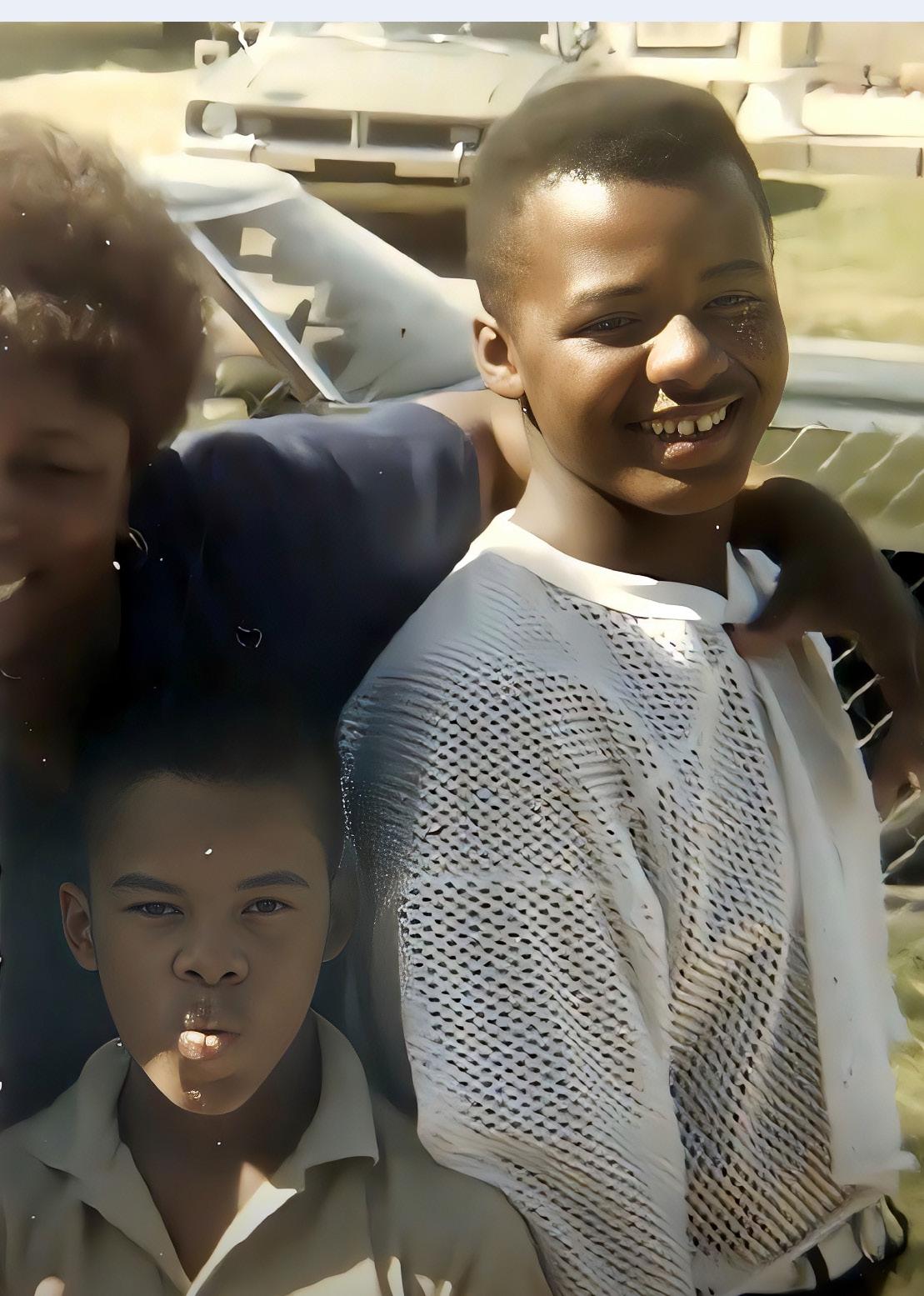
ment’s seemingly nonchalant approach to the investigation could be considered racial violence because of the way institutions “ignore people based on their racial differences.”
In 1989, Sheriff Boehm told media outlets that the department had interviewed 20 people during the investigation of Andre’s death, but his mother said she didn’t know of law enforcement interviewing anyone close to Andre. Notably absent from the interviews was Christian. He was the last person known to see Andre alive, but law enforcement never questioned him.
Christian and Natasha say the FBI report listed some people that the sheriff’s department supposedly interviewed in 1989. One of them was Wendi Newman, who was a classmate of Andre’s and lived in the Clearview neighborhood. Today, Newman tells a different story. “It says in there that the detectives interviewed us as children,
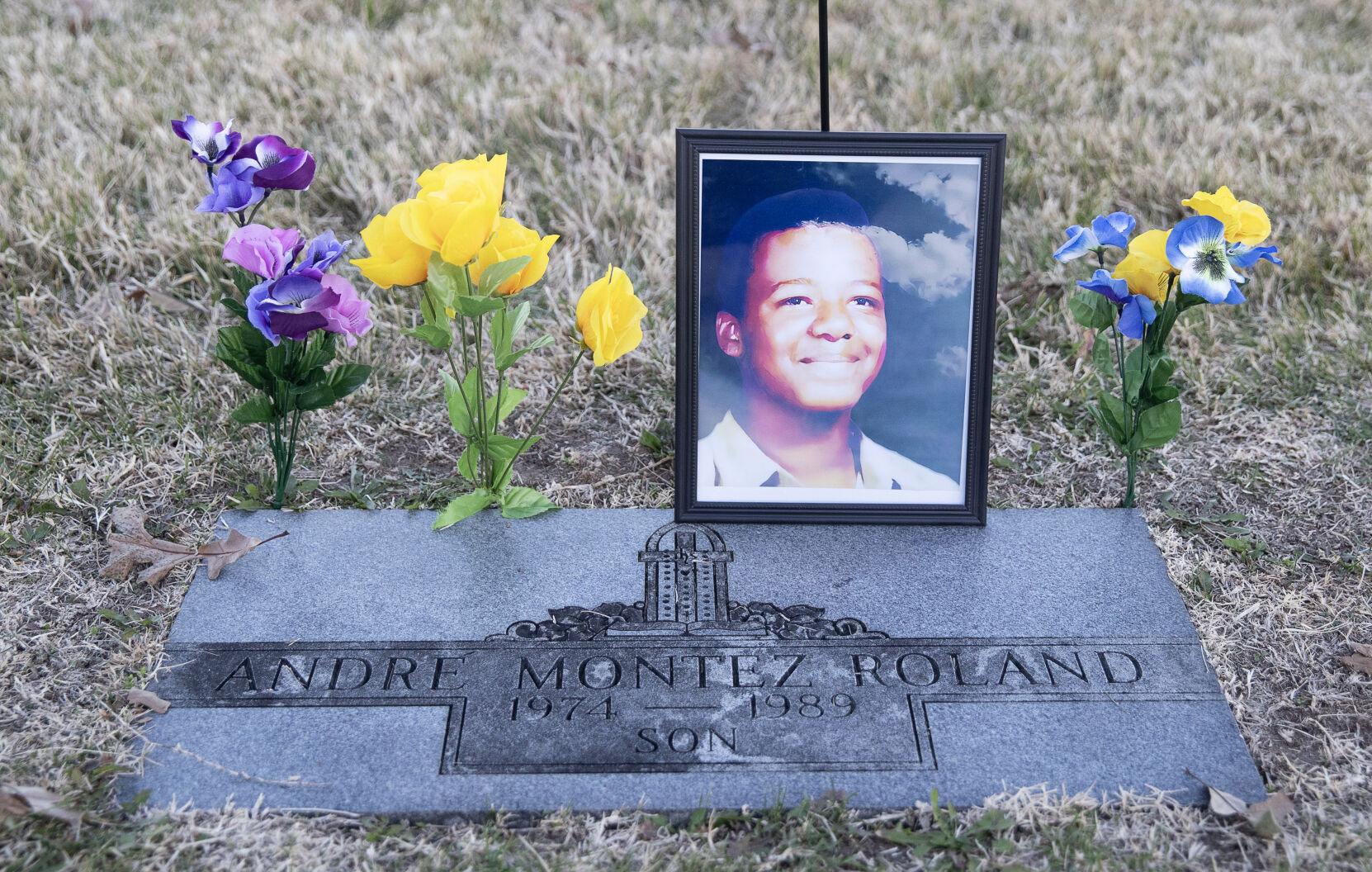
and so far everybody I know of that is listed in there — myself included — did not speak with any police officers,” Newman says.
More inconsistencies cloud the investigation. There are discrepancies over who found Andre’s body. There are discrepancies over his body’s position when he was found and whether the tree limb would have been sturdy enough to support his weight.
These are the types of questions that could remain after any investigation, but as Black community leader Raymond Prince told the Columbia Daily Tribune at the time: “If this had been a white kid, they would have combed the neighborhood.”
If investigations into a death are as much (or more) for the benefit of the living as the dead, then this investigation failed Norma Roland. Deputies refused to let her see her son’s body at the scene and attempted to turn her away at the Fountain Mortuary Service when she went to identify the body, according to a March 1989 Columbia Daily Tribune article.
“When I got to the mortuary, they said I could identify him at the funeral,” Norma told the Missourian. “I am disappointed by the way I have been treated, the way my family has been treated,” she said. “I’m disappointed in the investigation.”
In May 1989, the local NAACP requested a grand jury inquiry into Andre’s death after collecting over 1,000 signatures on a petition. The petition included a myriad of grievances over the discrepancies in the investigation.
The petition was rejected but then-Sheriff Boehm later approached Norma and leaders from the local
NAACP chapter to apologize for not letting Norma identify her son’s body, according to the Columbia Daily Tribune.
Andre’s death affects Christian to this day. He named his first child, Andre’al Lewis, after her uncle. He got a tattoo in his honor. But it wasn’t until 2017 that Natasha convinced Christian to do what he always wanted to do — find the truth of his brother’s death.
“Sometimes we miss opportunities, you know, early in life, but I feel like it’s never too late,” Christian says. “It’s never too late to get answers.”
People closely affected by unsolved deaths and cold cases often face prolonged cycles of post-traumatic stress disorder, says Jolynn Rice, the founder of Cold Case Advocacy, who has a master’s degree in community psychology and a bachelor’s degree in sociology.
“There’s just a lack of closure and resolution that continues that cycle,” Rice says. “Not knowing what’s going to happen, uncertainty about what’s going to happen and fear because you don’t know where the perpetrator is. Is it somebody in your family? Is it somebody in your community? There’s a sense of hopelessness.”
In 2018, Christian and Natasha started seeking answers and asked local law enforcement to reopen the case, but Brian Leer, current captain of the Boone County Sheriff’s Department, says there hasn’t been substantial evidence for reopening it. The Lewises have asked many times to reopen the case since then, most recently in 2023. Because it’s uncertain who was interviewed in 1989, the Lewises have been trying to track down peers or neighbors who might have information about Andre’s

death. In 2021, they created a 47-minute documentary titled “The Andre Roland Story” that highlights lingering thoughts and questions about the case.
The same year, they also revived the annual Andre Roland Memorial Scholarship, which offers two local high school seniors a scholarship for continuing their education. The scholarship is meant to “keep Andre’s name out there,” Christian says. The scholarship is an extension of the scholarship Norma Roland, Andre’s mother, started in 1989 after his death.
The couple also raised money through a GoFundMe campaign for a billboard aimed at finding more people who might have information about the case. From July 2023 to February 2024, two different billboards at 1901 Heriford Drive in Columbia showed a picture of Andre and large letters asking, “Do you know what happened to Andre Roland?”
The couple currently lives in Texas but tries to visit Andre’s grave site on his birthday in November every year. They often release balloons along with
their family and friends.
Since late 2023, the Lewises have been working with the Cold Case Foundation. Through the foundation, they have access to forensic experts, victim advocates, law enforcement and other advocates. The foundation is looking to collaborate with local law enforcement to help examine Andre’s case, says Ingrid WeinMuller, a member of the foundation and retired detective.
“We’re just assisting the (local police) department,” WeinMuller says. “We can support a forensics team with additional resources.”
WeinMuller says they are struggling with the case because they have no physical evidence to rely on.
However, Christian and Natasha have not given up on finding answers and plan to continue searching.
“For me and (Andre), it has always felt like we are in a long game of hide and seek,” Christian says. “Like he went out, and I was never able to get back up with him.”
Too many cooks in the kitchen? Not here. Go behind the scenes at Como Cooks Shared Kitchen, which gives Columbians a place to live out their food business dreams.


WRITTEN BY Sam Barrett
DESIGNED BY Gabby Nelson
EDITED BY Ian Wessellhoff

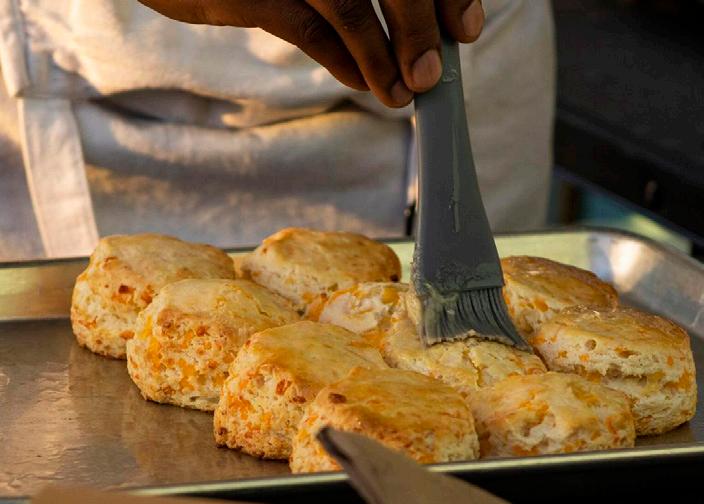


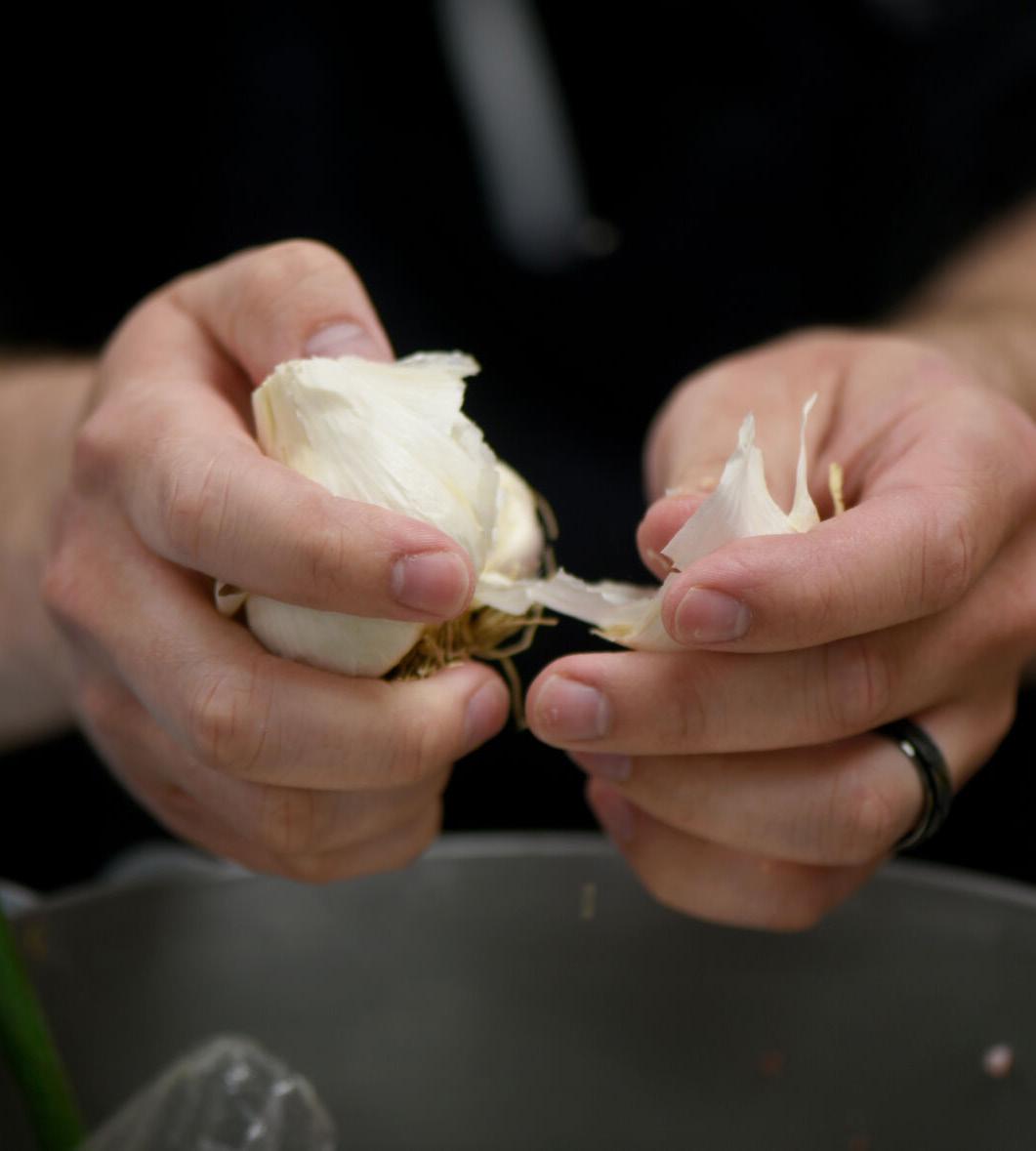
Trish Sieckmann has been working in a kitchen since she was 15 years old. She went to culinary school at Baltimore International College and opened her own bakery, TS Sweets, in 2018. Today, she manages over 30 cooks in a shared kitchen every weekday at CoMo Cooks Shared Kitchen, sharing her years worth of knowledge with small business owners.
Cooks can book time in the space on Business Loop 70 and have access to specialized equipment and resources.
When you walk in the building, Sieckmann will be there to greet you, sitting at her desk in a back corner of the lobby. While the building might seem small, it houses six commercial kitchen stations. There are sinks and counter space for prep work, along with plenty of commercial equipment: three ovens, eight burners, 17 refrigerator units, three mixers, a grill and a flat-top griddle.
The large kitchen space houses the sights and scents of varied cuisine. Whether it’s the Shiro Wot from Ma-

Why not get your next meal from a member of the CoMo Cooks Shared Kitchen? These vendors serve food out of coffee shops, food trucks, pop-ups and the CoMo Cooks home base. Vox compiled a list of seven vendors to check out — and there are many others. Find CoMo Cooks at 14 Business Loop 70 E. Look for the Loop banner above the door.
hi’s Ethiopian Kitchen or the Coconut Shrimp from Abbey’s Swahili Delights, the shared kitchen makes it possible for chefs to cook up small businesses when it would otherwise be out of reach. In doing so, Como Cooks enriches the cities culinary culture and diversifies its business scene.
Shared kitchen spaces fall into two categories: kitchen incubators and commissary kitchens. A commissary kitchen is a commercial kitchen space that allows for chefs or bakers to rent out a space by hour or by day. A kitchen incubator provides the same service, but with added flavor — help with marketing, distribution, legal aid and training. CoMo Cooks falls somewhere in between. It’s a rentable commercial kitchen space that also assists with marketing and finances. CoMo Cooks Shared Kitchen is one of a kind in Columbia, but not in the state. According to a 2019 Econsult Solutions study, shared commer-
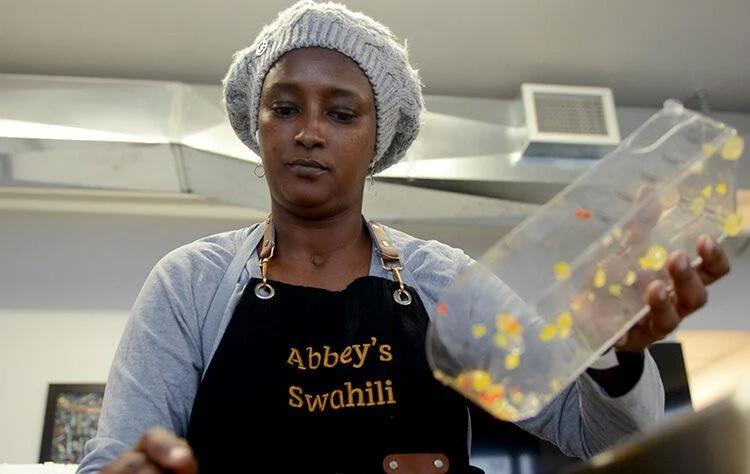
Abbey’s Swahili Delights is, as the name suggests, a Swahili food pop-up run out of CoMo Cooks. Owner Abbey Miller grew up in Kenya and brought her cuisine to Columbia.
Owner: Abbey Miller
Find her at: CoMo Cooks
Shared Kitchen, 5-7:30 p.m.
Friday
Contact: 573-682-0545, Abbey_Mitchell on Instagram
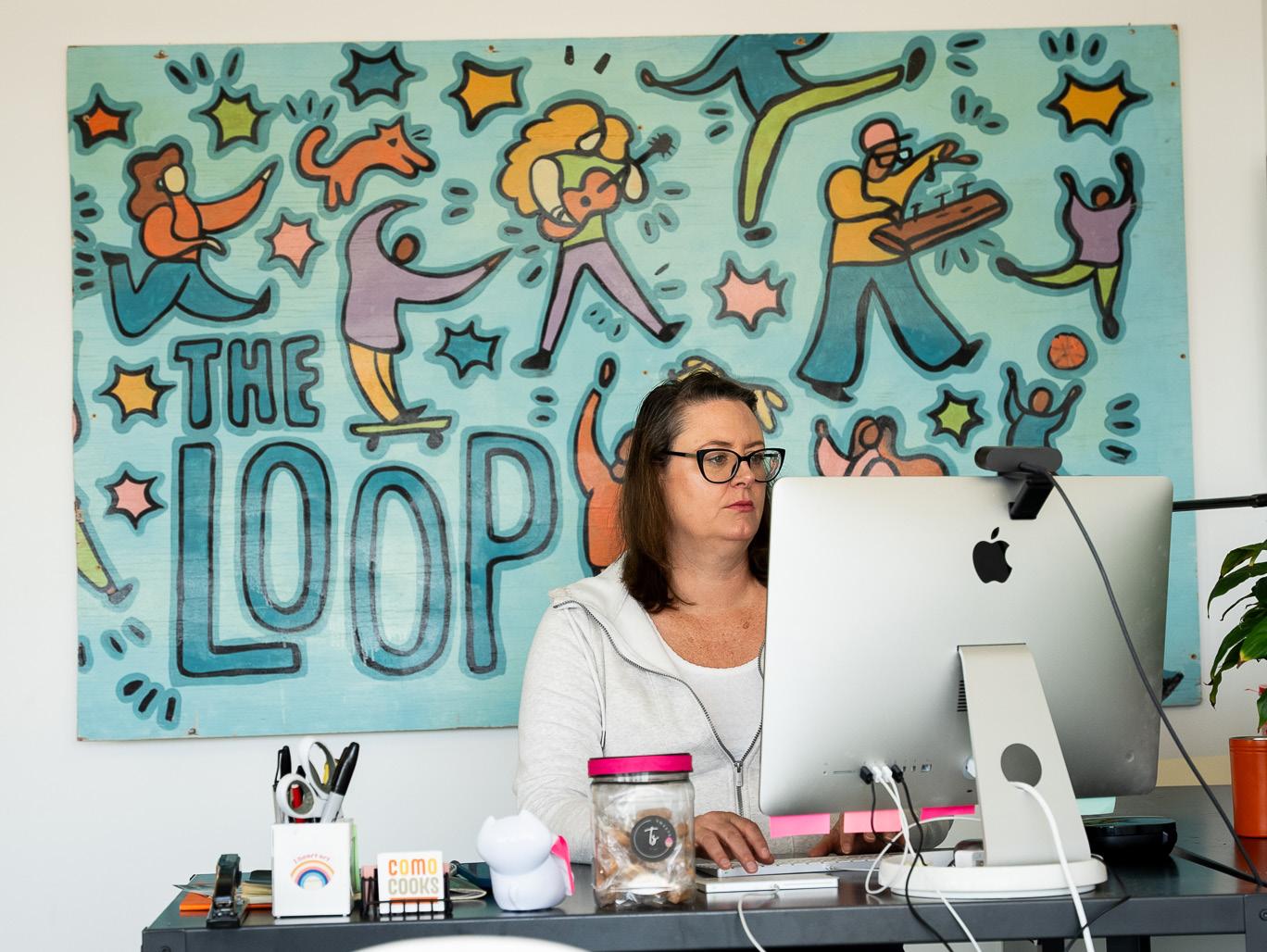
cial kitchen spaces have a presence in 44 states. St. Louis has a few, including STL Foodworks, Kitchen Hub STL and Be Well Cafe and Market.
CoMo Cooks opened in December
2020 when The Loop Executive Director Carrie Gartner was looking to add a layer of economic activity to the street. She discovered through focus groups that there were a number of undiscov-
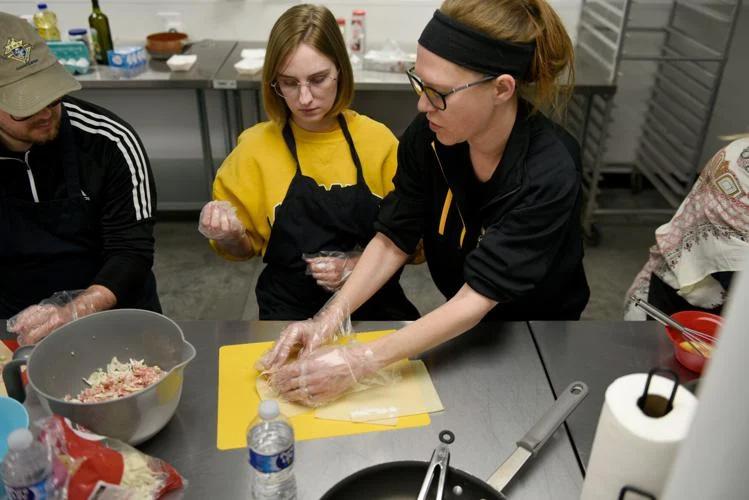
Chef Ashley Nichols started Back 2 Basics Cooking in 2014 after eliminating dairy from her diet. She utilizes CoMo Cooks Shared Kitchen to educate others. Classes include kid-friendly cooking and date night lessons.
Owner: Ashley Nichols Find her at: CoMo Cooks Shared Kitchen, hours vary Contact: 573-268-2248, back2basicscooking.net, Back 2 Basics Cooking on Facebook
ered local food makers who didn’t have the space or equipment to properly grow their businesses. “There was a call for this,” Gartner says.
The shared kitchen started with nine small businesses when it opened in the Mizzou North building on the Business Loop. While opening during the COVID-19 pandemic proved to be difficult, they still received calls weekly, Gartner says, from “people who could never afford to start a business and now have an option.”
According to the 2019 Econsult Solutions study, 52% of people who use kitchen incubators are women and 30% are people of color. Many of the 33 chefs at CoMo Cooks fit that description — 19 are women and 15 are people of color.
CoMo Cooks also has opened the door for more international food in Columbia. In just one kitchen space, you can find Italian, Venezuelan and Ethiopian food. And that’s just the start, Sieckmann says.
Sieckmann says that a commissary
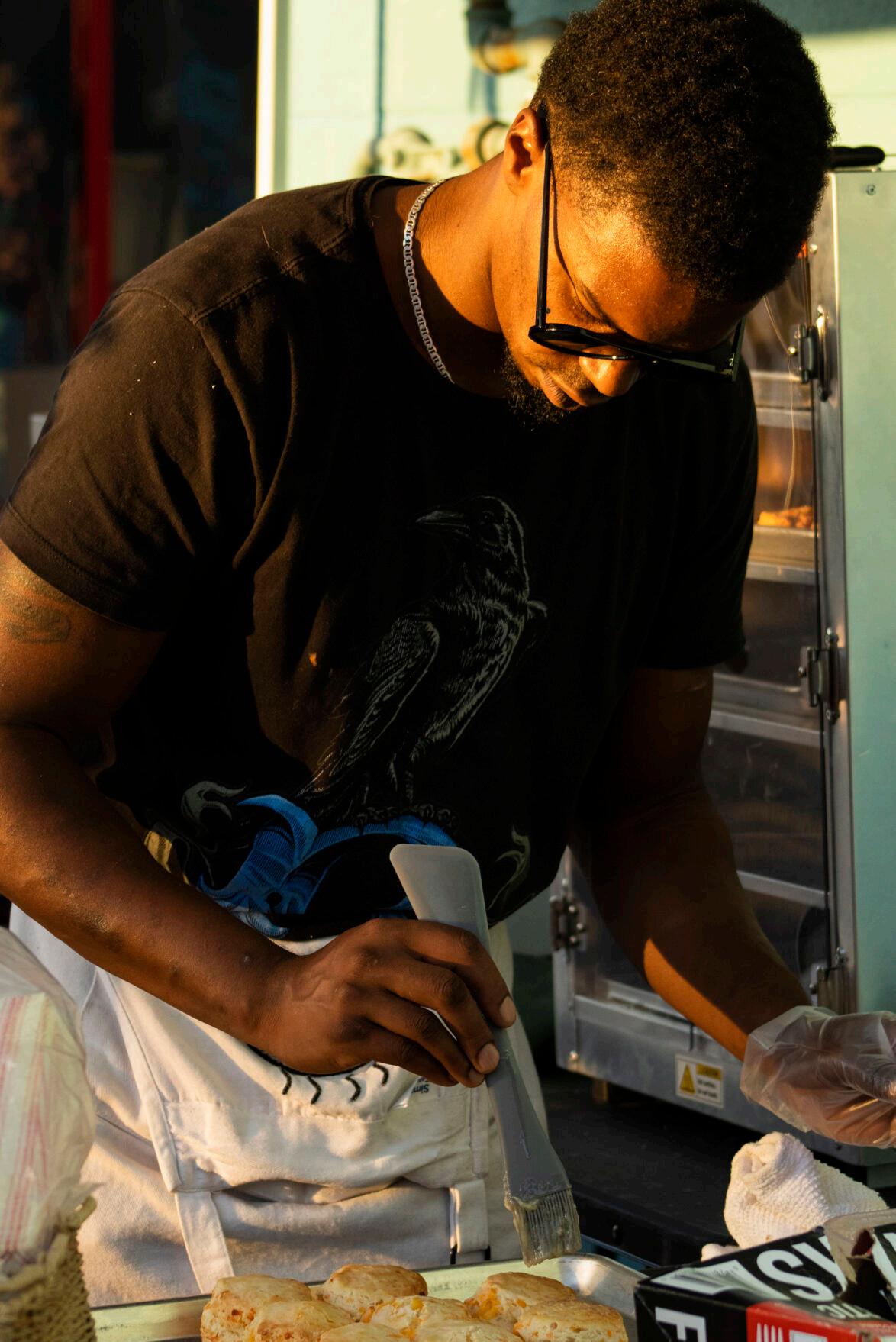
The Biscuit Center specializes in homemade biscuits, but it also sells pancakes, quiches and hashbrowns. Customers can come to CoMo Cooks to pick up their orders, but the business also utilizes DoorDash for delivery and offers catering.
Owner: Scott Pass
Find him at: CoMo Cooks Shared Kitchen, 6:30 to 11 a.m. Monday through Thursday Contact: 573-825-5597, thebiscuitcenter.com
kitchen is meant provide opportunities for people who might not have had them previously. The shared kitchen space allows people to utilize commercial equipment and other benefits for their businesses, while promoting networking and creating community.
When Mizzou North was set to be torn down in 2022, CoMo Cooks moved to a new location on Walnut Street. That’s around the time when Sieckmann joined the team as the manager and a baker for TS Sweets.
To this day, Sieckmann and Gartner are the only two people operating behind the scenes at CoMo Cooks. While located on Walnut Street, Sieckmann says she normally only saw two clients regularly: The Biscuit Center and Highbread Bakery and Treats. At the time, she says clients struggled with reserving kitchen time and the space didn’t give them room to grow.
After opening on Business Loop 70 in March 2023, CoMo Cooks has doubled in size — and still has more room to

share. From her spot in the lobby, Sieckmann sees any number of cooks go in and out throughout the day. She is in the kitchen until 3 p.m. on weekdays, but says cooks are delivering, cooking or preparing for events anytime from 6 a.m. to 3 a.m.
As she works, Sieckmann hears ovens closing or mixers running and catches various aromas, from whiffs of international cuisines to fresh baked goods. While it can be overwhelming — like standing in the food court at the mall — Sieckmann says she’s “just used to it” after being in a kitchen for what feels like her whole life.
As chefs come and go, it’s a wonder there’s never too many cooks in the kitchen. This is thanks to the first-come first-served space reservation and scheduling system, all of which Sieckmann handles.
Business owners have several options when deciding how to use the CoMo Cooks Shared Kitchen space. Tier one includes 10 hours of kitchen time per month. Tier two is 50 hours. Tier three climbs to 100 hours and finally, tier four

Como Arepas serves Venezuelan food, specializing in arepas, but also empanadas, tequeños and cachapas. Yumivia and Jose Rojas began using CoMo Cooks in August 2023 and started serving at Aroma Coffee House in October. They hope people will become more familiar with their country’s food and culture.
Owners: Yumivia and Jose Rojas
Find them at: Aroma Coffee, 1009 N. Providence Road, 7 a.m. to 7 p.m. Monday through Friday; 7 a.m. to 5 p.m. Saturday; 8 a.m. to 4 p.m. Sunday Contact: comoarepas.com, Como Arepas on Facebook

Highbread Bakery and Treats sells THC-infused baked goods and treats via a truck on Tenth and Walnut streets. Patrons can buy a variety of Delta-8-infused items, including ice cream, popcorn, green waffles, pickle pizzas and lemon-zucchini loaf.
Owner: McPeak
Find them at: Tenth and Walnut streets, hours vary Contact: 573-214-1067, highbreadbakery.com, highbreadbakeryandtreats on Instagram
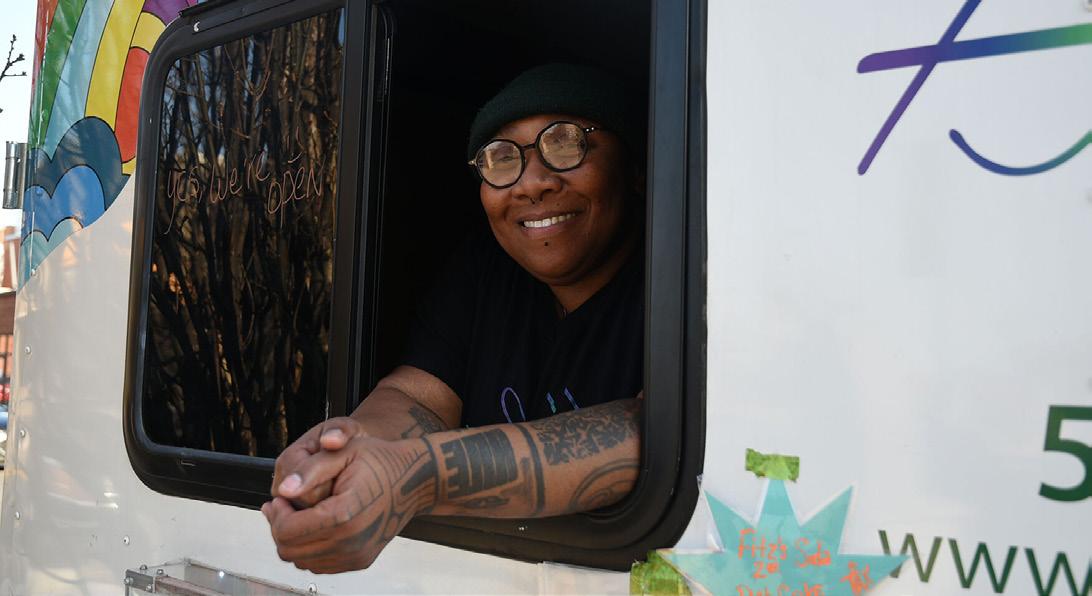

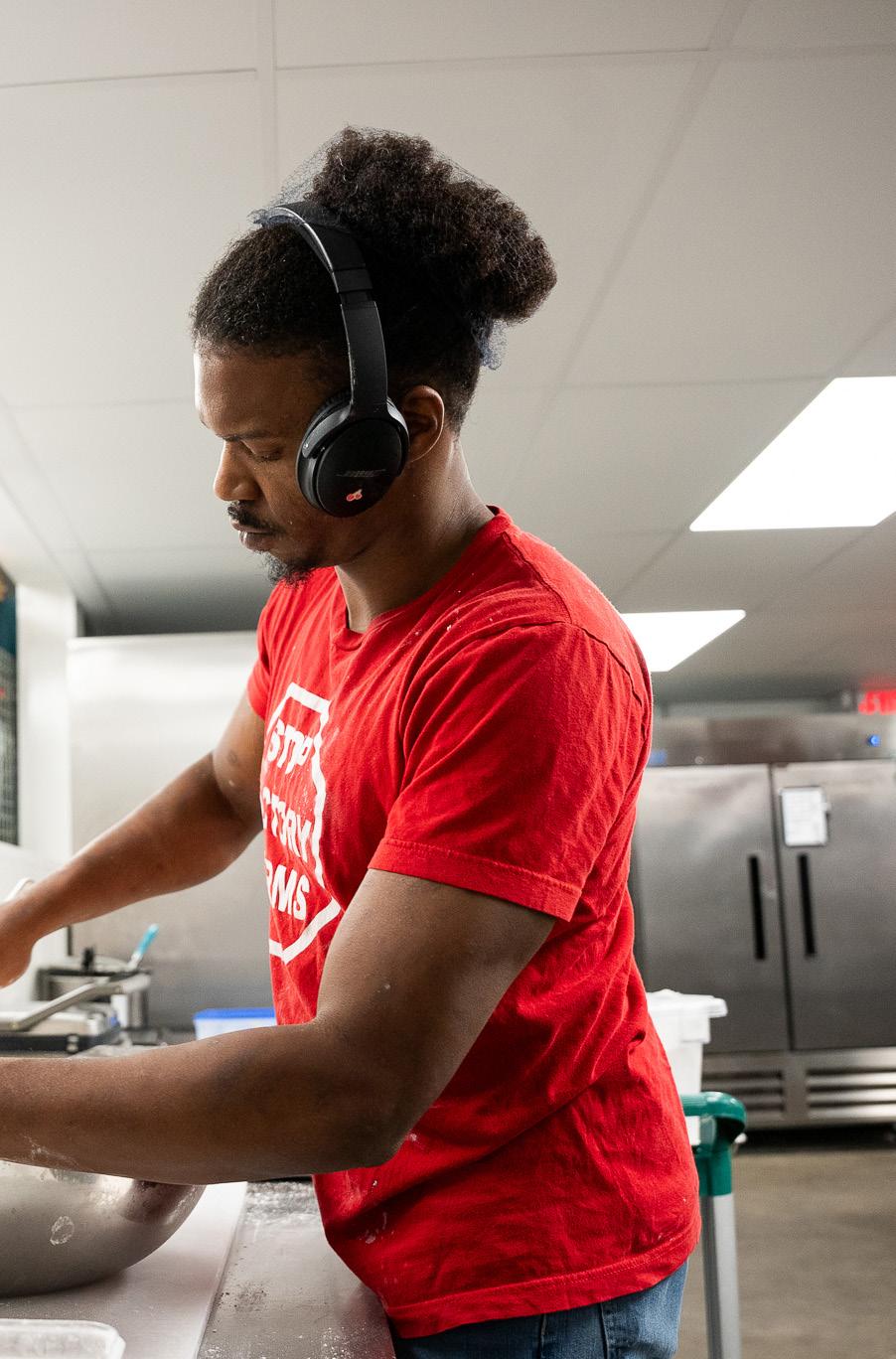
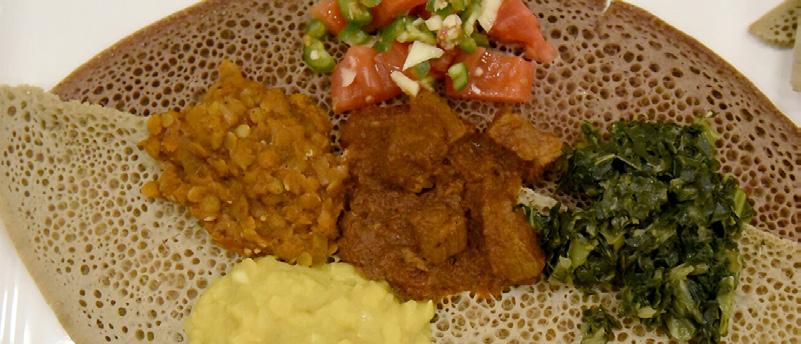
Mahi’s Ethiopian Kitchen serves a rotating menu of Ethiopian cuisine. Mahi’s posts an updated menu weekly on social media with most entrees under $15. Options include vegetarian meals and spiced meats. To get acquainted with the repertoire, an Ethiopian Sample Platter is available that includes three to four dishes. All orders come with injera, a flat bread meant for scooping up food.
Owner: Mahalet Tesfaye
Find her at: CoMo Cooks Shared Kitchen, 5-7 p.m. Monday and Wednesday
Contact: 573-554-2046, mahis_como on Instagram
is designated for food trucks. Instead of getting kitchen time, food trucks get access to supplies, storage and other benefits that come with being part of the shared kitchen.
Another one of Sieckmann’s many tasks is providing a cleaning schedule. All cooks who use the kitchen space are responsible for following a cleaning checklist before they leave, and business owners can earn some credit kitchentime if they offer to clean common areas such as the lobby or bathrooms.
University of Missouri alumna Mindy Jahn is the owner of MJ’s Feast and one of the many cooks who utilize the kitchen. Jahn has been a chef for 25 years, and it has been her dream to open her own restaurant, but she didn’t know where to start. One day, Sieckmann, Jahn’s friend of almost 30 years, asked her, “Have you heard of CoMo Cooks kitchen?” Jahn thought it was some kind of Facebook group, but after Sieckmann explained her position as the kitchen manager, Jahn became interested.
“I was like, ‘Oh, my gosh, this is an amazing project. I definitely want to be
part of that,’ ” Jahn says.
MJ’s Feast is a personal shopping and catering company that serves glutenfree lunches and dinners featuring different types of cuisine, from African to Indian to Mexican. Jahn, who handles accounting work for a construction company, spends between 55 and 60 hours a month in the kitchen.
Sieckmann is often there when Jahn is, popping in to see if she or any of the other cooks need any help. “It’s just really great camaraderie,” Jahn says.
Sieckmann feels the same way. “There’s a lot of benefits from this kitchen, not just renting the kitchen,” Sieckmann says. “There’s a lot of community here. We have a chance to all talk to each other about our businesses and share thoughts.”
Jahn says one of the things she appreciates most about CoMo Cooks, outside of the community it provides, is the marketing. Sieckmann helps set up the page on the CoMo Cooks website for all the clients. Here, cooks can list details about their food, promotional materials and contact information.
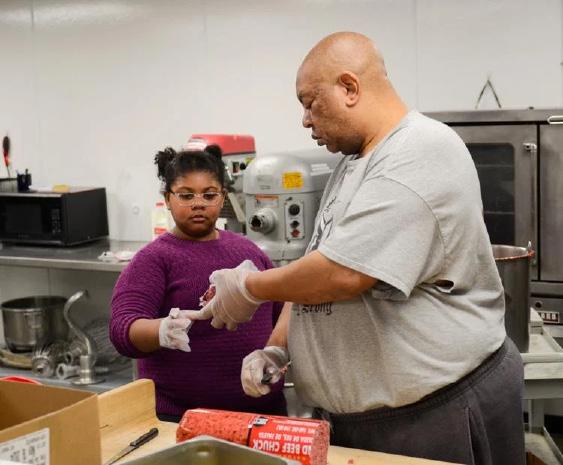
Sully Sauce is a familyowned and operated business that sells one thing: Sully Sauce. While owner Chris Sullivan will tell you it’s good on almost anything, it’s best described as a red spaghetti sauce filled with meat and lots of vegetables. Normally, when Sullivan is in the CoMo Cooks Shared Kitchen, you’ll find his 10-year-old daughter, Autumn, helping out. Sullivan started the business in June last year in hopes of passing it on to his daughter.
Owner: Chris Sullivan
Find them at: Pop-ups or events around town
Contact: 573-777-2190, Sully Sauce on Facebook

Sieckmann also regularly advertises for different businesses at CoMo Cooks on social media. Jahn says her business has had extra visibility and gained a lot of new customers since starting at CoMo Cooks. MJ’s Feast has grown so much that Jahn says she’ll have to hire an employee or two soon.
On top of offering commercial kitchen space, marketing and a community where small business owners can learn from each other, CoMo Cooks offers financial support. A combination of grants from Central Bank of Boone County, the City of Columbia and a partnership with the Missouri Women’s Business Center allowed for CoMo

can cook if they operate out of their home rather than a commercially certified kitchen. Due to that law, Pass says he couldn’t use ingredients like meat, eggs or other foods that could cause contamination when cooking out of his home. Since working out of the CoMo Cooks Shared Kitchen, Pass has the ability to upgrade his menu to include items like his Deluxe Sausage & Egg Biscuit.
Lauren Kaufman, owner of Wildflower Consulting, combines baked goods and cannabis to create treats.
Cooks to create the Minority Business Owner Scholarship, Sieckmann says. This scholarship offers two businesses $3,000 and a paid six-month tier-one membership.
Two past scholarship recipients still utilize CoMo Cooks Shared Kitchen: The Biscuit Center and Abbey’s Swahili Delights. Scott Pass, owner of The Biscuit Center, became a kitchen client in 2022, around the same time he won the scholarship as one of its first recipients. At the time, the scholarship also came with business coaching from the Missouri Women’s Business Center.
“I think it would have been a lot more overwhelming if I didn’t have somebody who helped me start off,” Pass says.
Pass started The Biscuit Center in
Find CoMo Cooks Shared Kitchen at 14 Business Loop 70 E. There’s a list of food vendors, plus directions about how to order food and get there, at cre8como.com/ como-cooks.
While Pass says it’s great that CoMo Cooks provides a space for Black-owned businesses, to him, it’s more about providing opportunities. “I would say it’s about bridging the gap for those who really want to start selling,” Pass says. He has been able to grow and branch out to additional places, such as the Columbia Farmers Market.
The Biscuit Center is open for pickup and delivery Monday through Thursday, but Pass is in the kitchen every day working toward his dream of opening a drive-thru store. “Eventually I will outgrow this place,” Pass says. “People have outgrown this place. That’s all of our dreams.”
Sieckmann has seen several businesses outgrow the shared kitchen space in her two years at CoMo Cooks, such as Pasta La Fata and, more recently, Dada Döner, a Turkish food truck planning to open a brick-and-mortar restaurant. However, leaving CoMo Cooks is never a sad thing. It puts a smile on Sieckmann’s face to know that CoMo Cooks Shared Kitchen had a part in creating spaces for small business owners while also bringing more diverse food to Columbia.




Architectural studies major Abby Hillman knows about construction. She did build a successful charcuterie business, after all.
BY MAYA DAWSON
Accidents happen. A dropped glass. A stubbed toe. Accidentally starting a charcuterie board enterprise out of your freshman dorm. Whoops.
University of Missouri sophomore Abby Hillman is the face behind Abby Does Charcuterie, a Columbia-based business that makes charcuterie boards and grazing tables. Her business started as a hobby, creating assortments of meats, cheeses and other snacks for friends in her dorm.
“I would post them on my Instagram and people started messaging me like, ‘Hey, could you do this for my birthday?’ ‘Could you do this for my graduation?’ ” Hillman says. “From there, it just kind of snowballed.”
Charcuterie boards as a trend are snowballing — whether that’s businesses like Hillman’s and Amazing Graze in Jefferson City, restaurant offerings or made-at-home collections of snackable bites. The boards are expected to increase 25% on U.S. menus in the next four years, according to a 2022 report from Datassential, a culinary market research platform.
Hillman credits charcuterie’s popularity to how pretty or Instagrammable the boards are, as well as their versatility. By definition, charcuterie boards only include cured meats, but the modern version has expanded to include everything from
cheeses to snap peas to chocolate.
Hillman is pursuing an architectural studies degree at MU. She often incorporates what she is learning into her work, like design principles and color theory.
At the beginning of her sophomore year, Hillman became a member of CoMo Cooks Shared Kitchen, which provides a place to assemble the boards. She says she can accommodate any request with dietary restrictions, and she customizes the boards with themes and letters cut out of cheese.
“She set up a phone call so we could chat about my vision,” says Callie Greenberg, one of Hillman’s customers. “She had me send some stuff from Pinterest that I liked and we just chatted about what would and what wouldn’t work.”
Hillman offers traditional boards, but also has on-the-go options and single-serve charcuterie cones for large events, where attendees can grab a small portion of charcuterie as opposed to reaching into a communal platter.
She is keeping her future options open, while enjoying getting to know local producers and her customers. “I have to remember I’m a student first, but I’m also a business owner, so kind of juggling both hats, but all the people that have been my clients and my customers have made it really rewarding,” Hillman says.
From $1 jello shots to elevated cocktails and live music, these women create places where people feel welcome.
BY LEVI CASE
When Son of a Gun opened last fall, it added a new woman-helmed bar to Columbia’s scene.
Just 32% of Missouri restaurants and bars are majority owned by women, according to the National Restaurant Association. But more women are coming from behind the bar to open their own joints. Meet the women behind five of the city’s popular watering holes.
Greta and Ava Gunderson | Owners of Son of a Gun Black-and-white checkerboard tiles line the floor of Son of a Gun, which opened in October 2023. Co-owners Greta Gunderson and younger sister Ava Gunderson have a motto: cold beer and fast cocktails.
Greta Gunderson, a 2017 University of Missouri graduate, got her start bartending at Roxy’s, the dance club once located above The Penguin Piano Bar. Since graduation, she has worked in 17 bars from Nashville to Omaha. She says she understands why women might not want to own a bar. “From a safety aspect, it’s not a glamorous job,” Gunderson says.
At their establishment, the Gundersons emphasize safety, empowering employees to maintain a positive atmosphere. “You do not have to allow anybody that you don’t want there,” Greta Gunderson says. “It really is just confidence; being very aware of your surroundings and being assertive, calm, kind.”
They envision Son of a Gun as a go-to neighborhood bar, catering to young professionals and serving the community for decades. “I want people to trust that we’ll be there,” Gunderson says. “I hope that continues to ring true and we are a neighborhood staple the next 20-plus years.”
Visit: 16 N. Ninth St.; 4 p.m. to 1:30 a.m. Tuesday to Thursday, 2 p.m. to 1:30 a.m. Friday to Sunday, closed Monday
Known for: Cocktails

After sending a child off to college, some parents lean into hobbies to fill their time. Karen Geotz, owner of Dive Bar, decided to immerse herself in the local bar scene.
Geotz seized an opportunity when her favorite spot, Tiger Club, closed in summer 2017. She launched Dive Bar in the same location that December.
Geotz is aware she’s in the minority of female leaders in the hospitality field.
“Traditionally, in this industry, in hospitality, more men are chefs than women. That
Sisters Ava (above left) and Greta Gunderson are the co-owners of Son of a Gun. They’re known for specialty cocktails like Don’t Be A Prick (right), made with vodka, lemon, pear and agave.
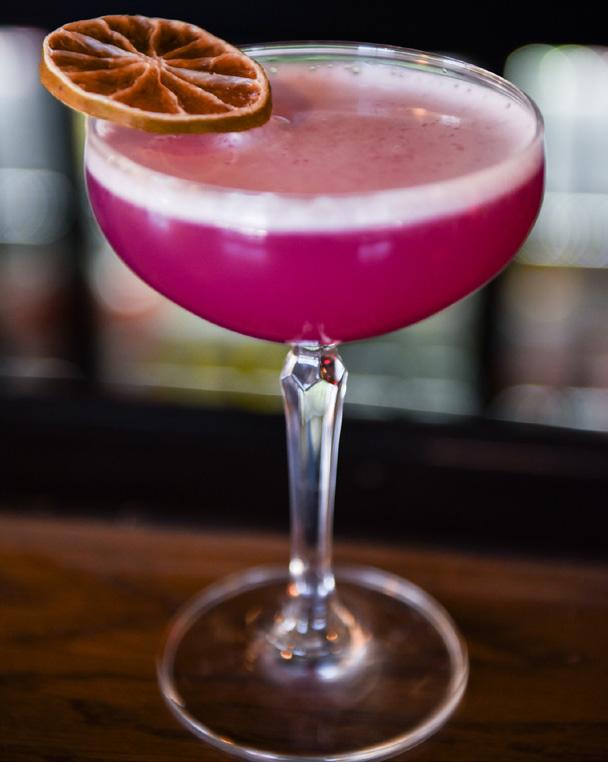
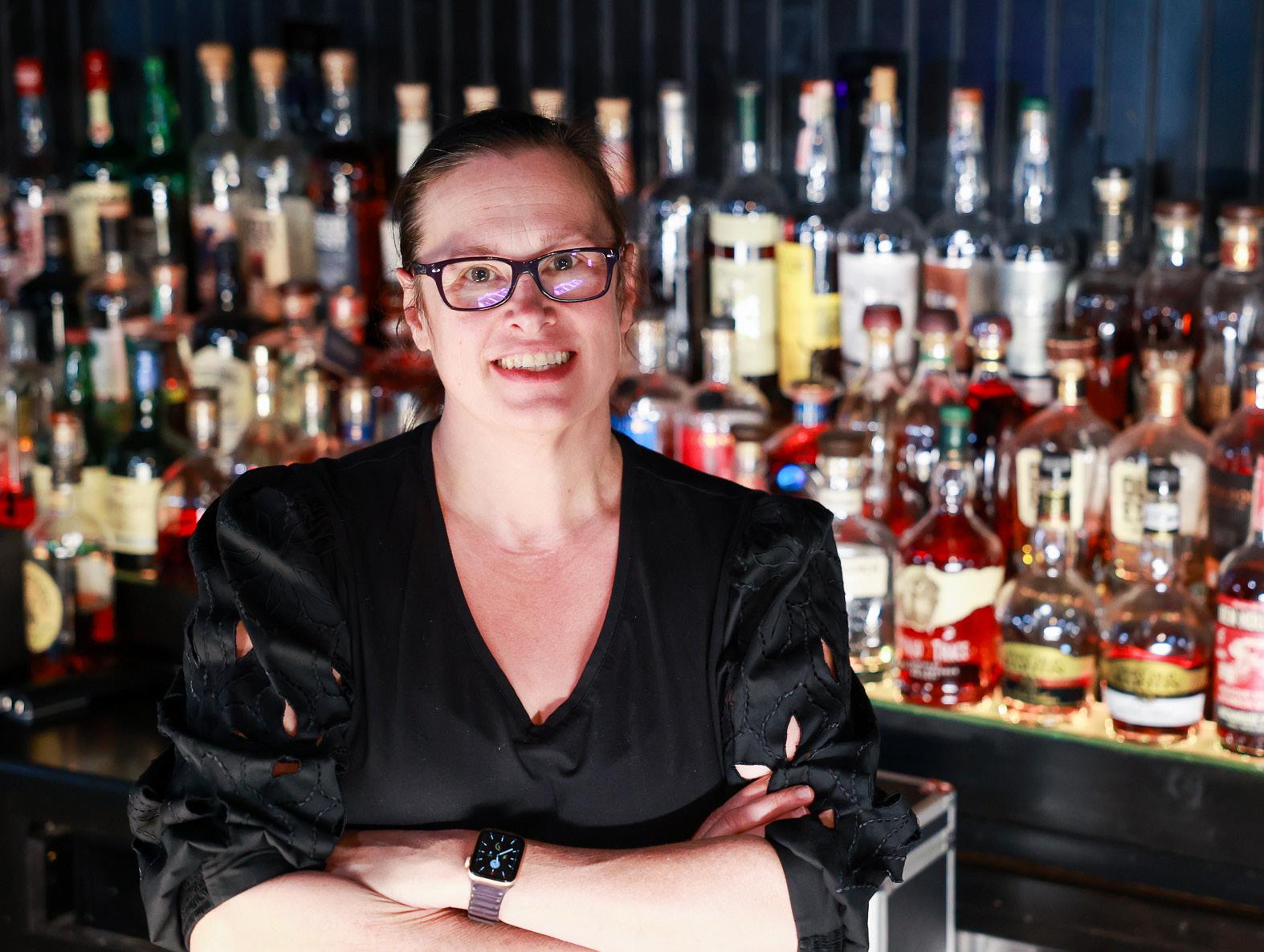


is just kind of standard,” Geotz says. “You look at even distilleries, breweries, master distillers and there’s very few women that reach those top positions.”
Just over two years after opening Dive Bar, her leadership was put to the test. When the pandemic shuttered bars, Geotz had to adapt to ensure Dive Bar’s survival. “We chose to stay open — we turned our business into a grocery store, providing essential goods, and then we did carry-out,” Geotz says.
Because of that pivot, Geotz proudly says the bar didn’t have to let a single employee go, which helped as the pandemic eased and businesses began re-
opening. “I truly feel like that was one of the reasons why we were able to come out on the other side of things,” she says.
Visit: 1116 Business Loop 70 E.; 11 a.m. to 11 p.m. Tuesday to Thursday, 11 a.m. to midnight Friday, 10 a.m. to midnight Saturday, 10 a.m. to 6 p.m. Sunday, closed Monday
Known for: Expansive whiskey selection and live music
Karen Krone | Owner of KLiK’s, The 5th Down Bar & Grill and Snapper’s
As the owner of three bars — KLiK’s, The 5th Down Bar & Grill and Snapper’s — Karen Krone says one holds a special place in her heart.
Snapper’s owner Karen Krone says jello shots are the most popular item due to their low price. Krone also owns KLiK’s and The 5th Down Bar and Grill.
While Snapper’s was Krone’s first “baby,” she was working to open KLiK’s while expecting her first child. “I rented the spot, KLiK’s, before I knew I was pregnant,” Krone says. “Then I found out, and kind of pushed things really quickly.”
KLiK’s opened in October 2006 and Hailey Krone was born in November. “I wasn’t working shifts probably the first month,” Krone says. “But then I started to come in and do the orders and stuff because I’d bring her with me.” Just six weeks after giving birth, Krone was back to work.
Even the name “KLiK’s” is personal. It comes from her full name — Karen Louise Krone.
In her 20 years in the industry, Krone has noticed a shift in women-owned bars. “There’s probably more male owners than females but I feel like, especially in the last five to 10 years, it’s kind of starting to change,” Krone says. “The gap is narrowing with more women opening bars or restaurants.”
KLiK’s: 205 N. Tenth St.; 11 a.m. to 1 a.m. Monday to Friday, noon to 1 a.m. Saturday and Sunday
Known for: Local hangout
The 5th Down Bar & Grill: 912 Rain Forest Parkway, Suite D; 11 a.m. to 11 p.m. Monday to Saturday, closed Sunday
Known for: Streaming sports
Snapper’s: 12 S. Seventh St.; 4 p.m. to 1 a.m. Wednesday to Saturday
Known for: $1 jello shots

Mya’s Gourmet Popcorn combines entrepreneurship, unique flavors and the McClain family’s hard work into sweet and savory treats.
BY ELLIE WEIEN
With bags in hand and stomachs rumbling, Columbia Mall shoppers can’t miss the comforting scents emanating from Mya’s Gourmet Popcorn. What they may not realize is that under all that butter and popcorn is a story about entrepreneurship and family.
The shop started as a popcorn ball kiosk and became a storefront with a variety of popcorn flavors in November 2022. Located between the Target wing and the food court, their vibrant popcorn can’t be missed. The family seeks inspiration from a variety of flavors, from raspberry lemonade to bacon cheeseburger.
Mya McClain learned to make popcorn balls from her aunt Brenda Crum. When McClain, principal of the K-12 Faith Walk Academy in Paris, Missouri, whipped out the recipe for a school party, the popcorn balls quickly became a student favorite.
Focused on assisting students with their futures, the academy introduced
From left, Mya, Ramiyah, Michael and Janiya McClain have crafted a tasty popcorn business that encourages family bonding.
Cups, a weekly event in Columbia for local entrepreneurs.
an entrepreneur project in 2019 that tasked students with improving their community. To help with fundraising for the project, students suggested McClain start a popcorn business and become a fundraising partner. It was a success. Years later, Mya’s Gourmet Popcorn continues to partner with multiple organizations for fundraising, splitting profits 50/50.
Despite not having a background in business, McClain succeeded with the help of her students, family, church and community.
McClain applied for grants and utilized Columbia’s resources. These included the LaunchU Course with the Women’s Business Center and the Small Business Administration’s Ascent Program — a pilot group for rural women entrepreneurs. She also applied for funding from the James and Annelle Whitt Entrepreneurial Development Foundation. McClain says she received valuable feedback by presenting to 1 Million
Mya’s Gourmet Popcorn has sweet and savory varieties. Find them on weekends at the Columbia Mall. The shop is open Fridays and Saturdays from 11 a.m. to 8 p.m., and Sundays 11 a.m. to 6 p.m.
Mya McClain suggests The Re-Mix, which is caramel corn coated in cheddar. Michael McClain enjoys Buffalo Ranch and Kettle Corn, while Janiya McClain can never say no to a cone of Totally Twix For more information, visit myaspopcorn.com.
McClain says the process of making the popcorn includes unique flavor recipes — sometimes inspired by colors they’d like to add to the store — and a commercial caramelizer to coat the popcorn with flavor. McClain’s husband, Michael, says he often helps with the savory flavors, making the perfect sweet and savory duo with Mya. “Without her I can’t do anything in the popcorn store, and without me she can’t,” he says. “We work together to make it successful.”
Everyone in the McClain family contributes to the popcorn process. When he is not operating his own business, McClain’s Electric Workz, Michael handles the popcorn deliveries and orders. The branding, packaging and graphic design is the work of their daughter, Janiya. She’s a 16-year-old senior at Faith Walk Academy and runs her own graphic design business, Nya Renee Designs.
Longtime friend and customer Augustine Hardin says she admires their family business dynamic. “I love how they do it collectively as a family. That’s sort of one thing I love about a family project,” Hardin says.
The entrepreneurial McClain family lends their hands to other businesses as well. Mya McClain advised Hardin on the creation of her business, Virtuous Virtual Assistant. They also help Michael’s sister, Johnonda Light, with her diner, JoMama’s Premium Seasonings and Family Diner. “We’re stretching ourselves, we’re helping other businesses and we’re changing the frame of what family looks like,” Michael says.
Mya McClain arranges popcorn cones by flavor. Mya’s popcorn pops — a popcorn ball in the shape of a lollipop — and tins have varying flavors from Caramel Apple and Spider Man to Strawberry Cheesecake.
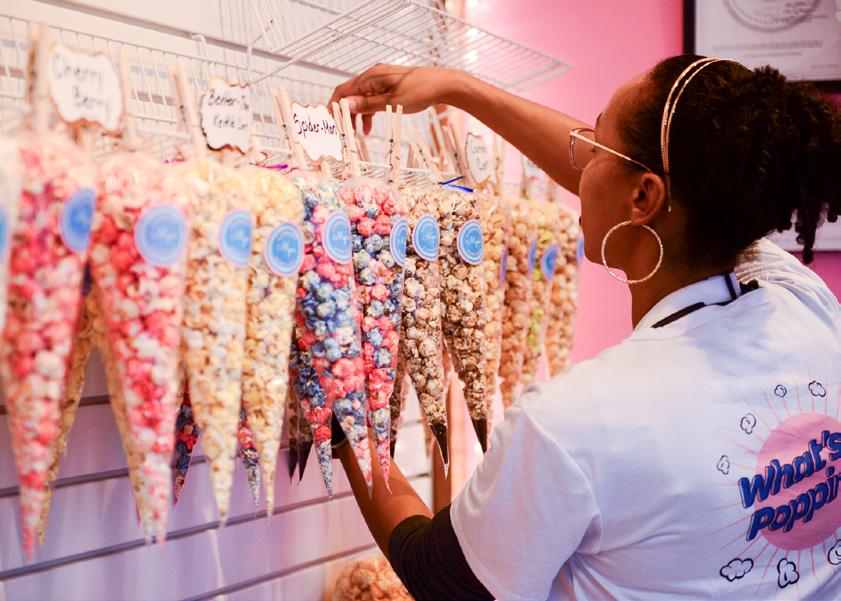
by

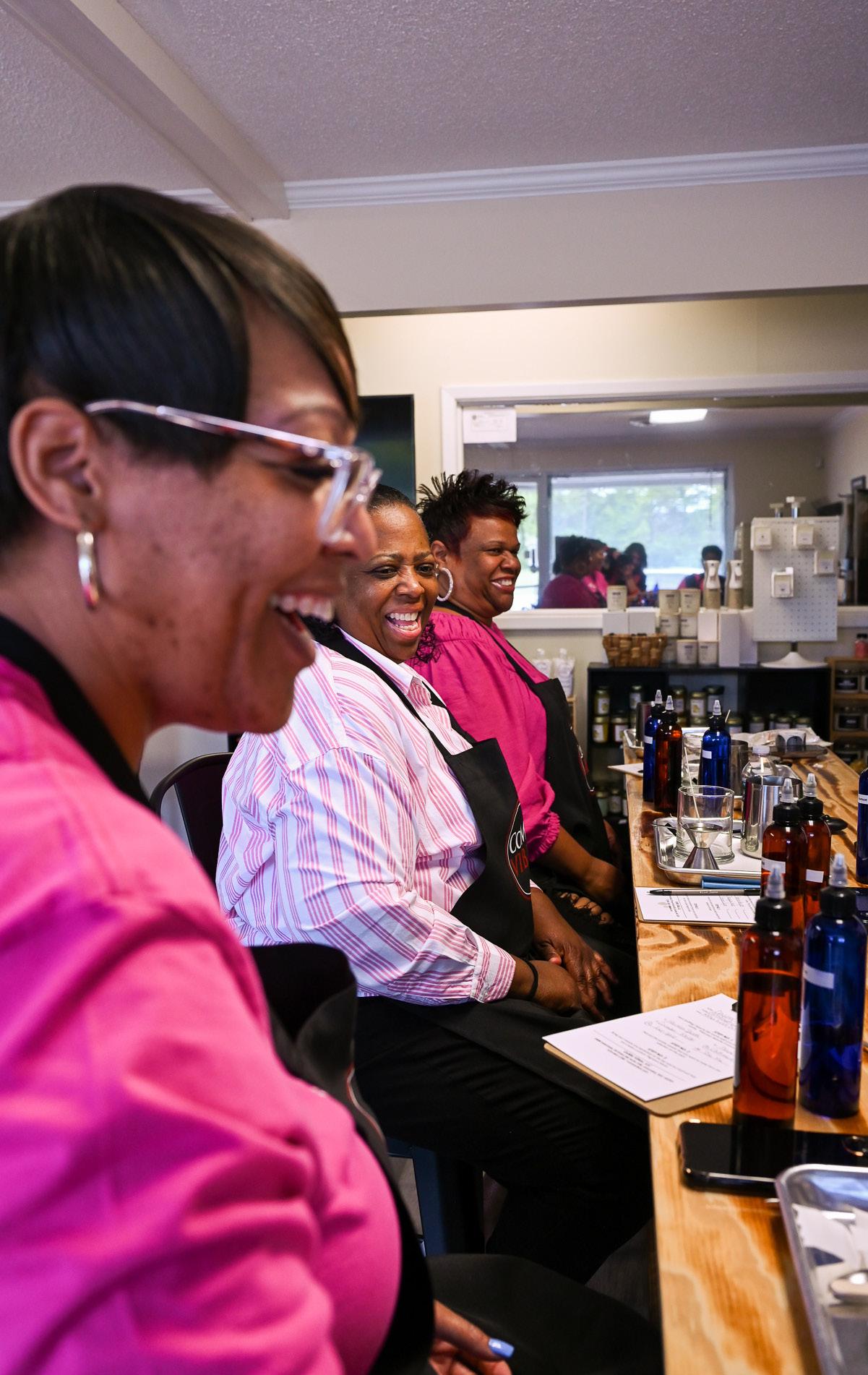

Two women-owned businesses in Columbia are creating more than just self-care products.
BY OLIVIA MAHL
Saving money in hopes of opening a dream business is one of many things that the owners of CoMo Vibes and K&K Co. have in common. The two Black women-owned small businesses sell a range of self-care and home products.
“People are now choosing to be responsible for their own finances and build their own generational wealth,” says Krystal Martin, owner of K&K Co. “So, kudos to small business owners.”
Nationwide, 39% of black-owned businesses are owned by women, according to Pew Research Center. In Columbia, there are 160 women-owned and minority-owned businesses.
Vivian Spears, owner of CoMo Vibes, and Martin each created their businesses for varying reasons. They talked to Vox about how they went from idea to product development to testing, and what they learned about the self-care business along the way.
CoMo Vibes
1408 Interstate 70 Drive SW #106
Owner: Vivian Spears
573-999-7316
Vivian Spears’ family members inspired her to start her own candle-making business. She previously had a clothing business that transitioned to selling hair bundles, body oils and candles. In 2016, she decided to rebrand and shifted to CoMo Vibes. She wanted to promote a great atmosphere, which is
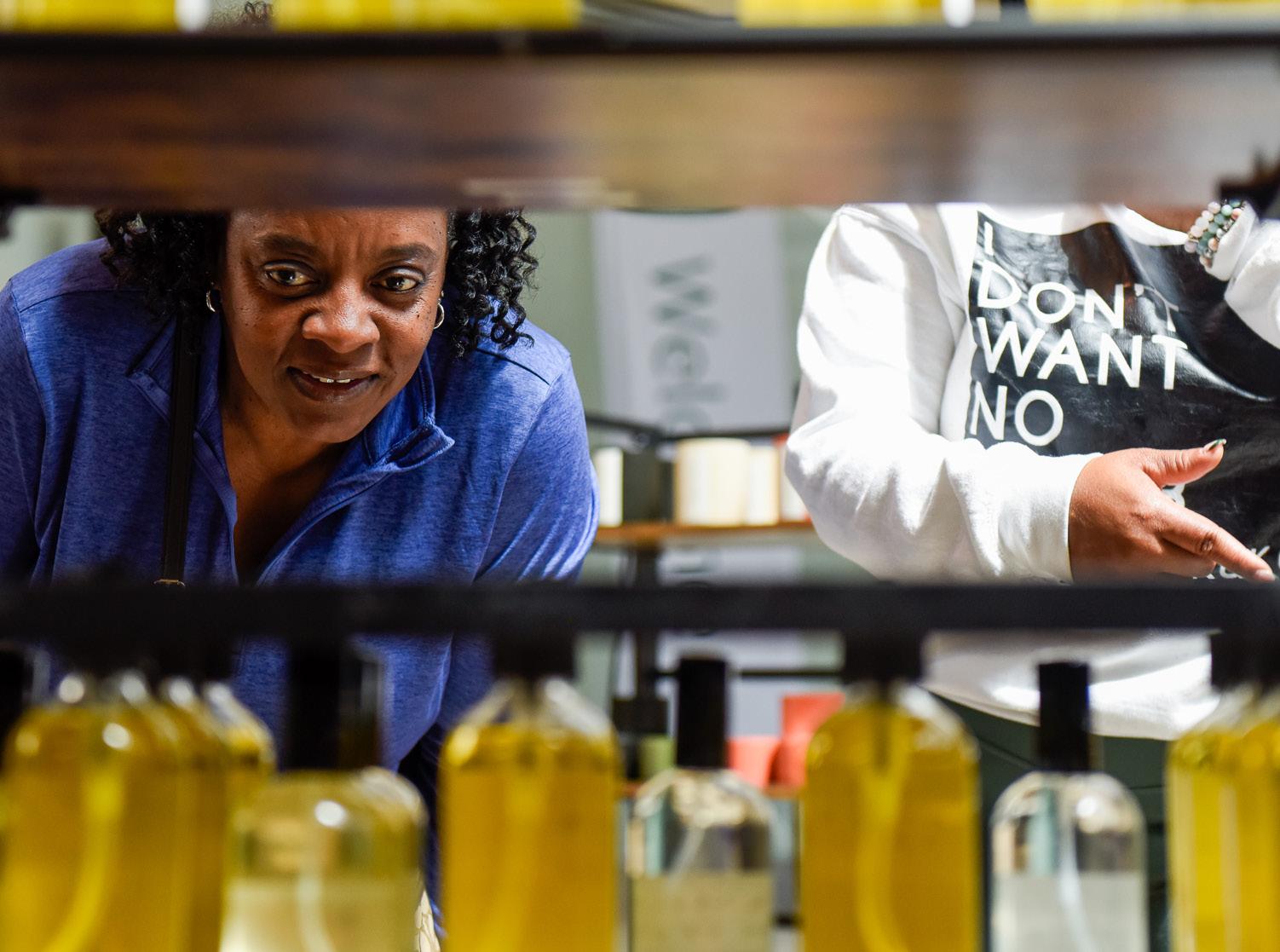
why she landed on the name.
CoMo Vibes offers soy candles, body creams and body oils; all of which are made locally and hand-poured. Spears chose soy candles after doing research and talking to different candle companies. She says soy candles have a cleaner burn. Customers can browse, purchase products and attend candle-making workshops at the candle bar. Seating up to 12 guests, anyone age 6 and older can participate in the candle-making sessions. When arriving at the candle bar, Spears already has jars laid out. Once you pick out your scents, it takes about 30 to 45 minutes to make the candle. You’re able to name the candle and pick it up the next day.
While tending to her business, Spears also has a full-time job at Woodhaven Learning Center. In this role, she works with adults with autism. “Sometimes it’s tough, especially if you’ve had a long day and have to go and open your business in the evenings,” Spears says.
Although it’s hard being the only employee at CoMo Vibes, Spears says she relaxes as soon as she’s there. She
enjoys the freedom that being an entrepreneur allows her while also being able to bond with customers. Spears says she responds to every review she gets.
“I’m a go-getter. I’m always on the grind, hustling, trying to make it work,” Spears says. She loves learning about how customers discovered her small business and wants people to know what she’s all about.
K&K Co. kkco.shop
Owner: Krystal Martin
573-228-1258
K&K Co. offers self-care and home good products. On production days, Martin and her youngest daughter, Moon, go to the garage, blast music, suit up in gloves, masks and hair nets and get to work. “You know how sometimes you forget to live in the moment? I have to remind myself to live in the moment throughout the process and once you get there, this is just so worth it,” Martin says.
Martin founded K&K Co. in April 2020 and named it after her two older daughters, Kayley and Karrington. Mar-
tin and her husband, Al, converted their garage into her business space. K&K Co. doesn’t have a storefront but sells products online. It hosts workshops at other locations for people to make their own products.
Martin says that all ingredients used in her products are ethically sourced. She ensures this by holding a relationship with wholesalers, having knowledge of the pricing and researching their ethical standards.
K&K Co. offers custom scent blending where customers can have a consultation with Martin to talk and learn about fragrances. After playing around with different pairings, the customer gets to decide if they want to purchase the fragrance or add it to a candle or other body product.
Martin also created an initiative called Bridging the Postpartum Gap. The company donates care packages to doulas to give to their clients to promote self-care and well-being. The inspiration for this came from Martin’s experience with an ectopic pregnancy and postpartum depression.
“Postpartum is dark and scary,” Martin says. She wanted to create something that stimulates healing, support and connection.
In 2023, she won the Entrepreneur of the Year award from the Missouri Women’s Business Center for Boone County. She also hosts candle business classes where she hopes to help other business owners bring what they have to the market. She views her classes as collaboration, not competition.
“Everyone has something unique to bring to the market, everyone’s business is not going to be like my business. Everyone is going to have something creative that they created on their own and I’ll just be the tool to get them there,” Martin says.
K&K Co. offers an assortment of body oils made with natural oils and fruit-based fragrance notes.

The Columbia Women’s Social Group provides friendship and support for women of all ages.
BY AUDREY ELLIS
Whether it’s a hit show from the ’90s, a catchy tune from Toy Story or a blue “follow” button on social media, we’re surrounded by reminders that friends matter. Friendships are pivotal in people’s lives and can lower depression and anxiety, according to the American Psychological Association. Yet many have difficulties making new friends once they’re past their school years.
According to the American Psychological Association, women feel more stressed and lonely than men. The Columbia Women’s Social Group aims to remedy this. “Your social support system is just such an integral part of your life and your happiness,” says Sarah Potter, one of the group’s founders and a current member.
With nearly 1,000 members, the Facebook group connects local women through group activities like book clubs, painting sessions and brunches. It encourages women to leave other obligations at home and focus on themselves.
A new social scene
Ashley Granger — one of the group’s administrators — found her closest friends through the group. They met on Meetup, an online platform for organizing and joining gatherings.
“There’s something about having the kind of friendships as an adult that you had when you were younger — like those best friends that you had,” Granger says.
For years, the group has helped bring the women of Columbia together through fun activities and events,
Photography by Vanina Dimitrova
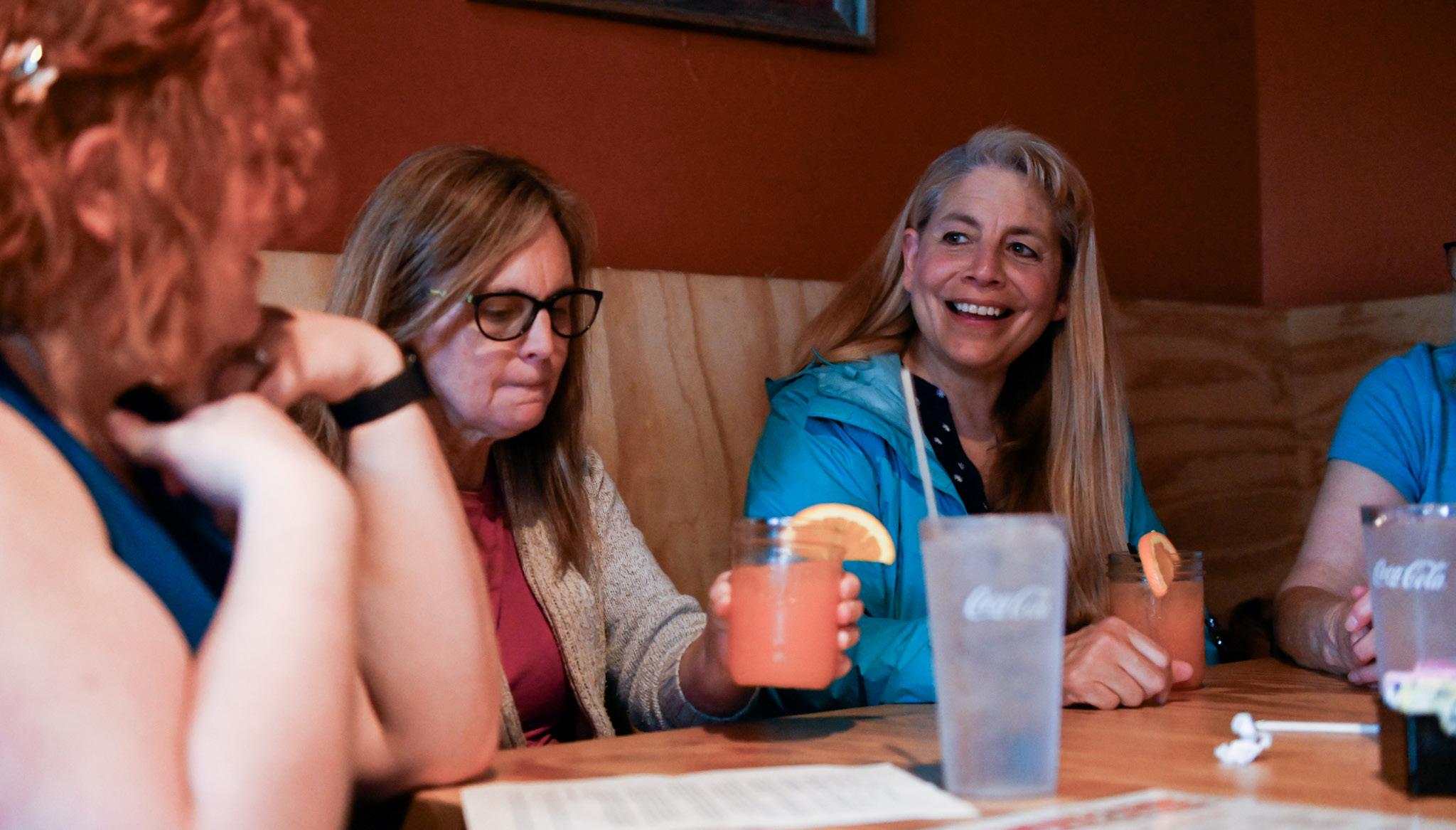
promoting emotional and physical bonding. Sally Herrick discovered the group through her mother, who had been a member for over 10 years. When Herrick graduated from college and her friends began to move away, her mom encouraged her to go to the group’s brunch.
After attending a few events and becoming a mother herself, she is more active and attends the group’s book club. “I have something now that I look forward to each month, knowing that I’m going to find other women who also enjoy the book that we’re reading,” Herrick says.
One of the group’s former members, Anne Fisher, joined after graduating college. The group seemed low-pressure, she says. Not long after she joined, she learned what she had in common with the other women. For a white elephant and cookie exchange, she made the bold decision to bring the movie Magic Mike as her gift.
“We’re sitting around opening presents, and literally someone opens another present and it is Magic Mike. Someone else brought Magic Mike!” Fisher says.
One of the most important parts of the social group is the support the women offer each other. Shannon Frey moved to Columbia in August 2023 and joined to connect with new people. “I’m
Social group members suggest three tips for making friends.
BE A JOINER. Sarah Potter says to look for groups you’re interested in. “The more you go and experience things with a group of people, then you start to build those connections.”
BE GENUINE. To connect with people, be yourself. “People like people who aren’t putting on a show,”Anne Fisher says.
OFFER A HELPING HAND. Volunteering is a great way to get involved and give back to your community, Shannon Frey says.
grateful that it exists for people like me who have moved and know not a soul,” Frey says. “There’s also people that are older and have lived in Columbia for a very long time, and their kids have moved away or their partner isn’t around anymore.” The group serves a variety of purposes for a variety of women.
The Columbia Women’s Social Group is more than brunches, painting and book clubs. It offers friendship at its simplest and support at its strongest.
“We really need those close friendships to feel like you have support in the world,” Potter says.
Each woman has a different perspective about how the group has helped them when they needed it most. For some, they leaned on each other when they became mothers; for others, it helps them get out of the house.
“Women are so often made to feel guilty, like we should constantly be climbing the ladder and doing more at home and doing more for our family,” Granger says. “Where is the time for us?”
When it comes to making new friends or getting a new hobby, finding support doesn’t need to be hard. The friendships built in the club help women discover that navigating life is better with friends.
Five local activists share the personal reasons that spurred them to work toward peace.
BY MARY RUTH TAYLOR
Governments and humanitarian organizations worldwide are demanding a cease-fire in Gaza. Since October 2023, the Israeli military has killed at least 34,000 Palestinians in the Israel-Hamas war, including over 14,000 children. Hamas militants have killed more than 1,100 Israelis, and 130 hostages are still presumed held by Hamas after its Oct. 7 attack on Israel.
This war has decimated the Gaza Strip. About 85% of its population is internally displaced and more than half of people’s homes, places of worship, hospitals and schools are destroyed, according to Al Jazeera. Access to clean water, food and medical supplies is extremely limited and U.N. officials say northern Gaza is now in a famine.
In Columbia, activists are demonstrating, fasting and fundraising to make their voices for peace in Gaza heard. Meet five of those activists and learn why they got involved.
MARK HAIM
Mark Haim has been an advocate for peace for decades. He began by protesting the Vietnam War and continues with his work as the director of Mid-Missouri Peaceworks. Since October, Haim and the Peaceworks team have held demonstrations, spoken with congressional delegations and organized a rolling hunger strike.
“It’s important for all of us people of conscience to stand up and call for a peaceful, non-violent conflict resolution, but moreover, it’s incumbent upon Jewish people in the United States to make our voices heard, and be voices for justice and for peace,” Haim says.
As a Jewish person, Haim grew up thinking of Israel as a haven for an oppressed people. Now, he says
the Israeli government’s actions are illegal and fuel antisemitic ideas. He believes a resolution that addresses the legitimate needs of both Palestinians and Israelis is necessary for peace.
Haim and a small group gather daily to demonstrate in front of Columbia’s city hall, holding signs with phrases such as “Let Gaza Live” and “Gazans are starving.” He hopes the protests will wake people up and encourage them to get involved.
“These struggles take lifetimes,” Haim says. “I hope people will see the conflict going on right now in the broad context of a struggle for a more peaceful world.”
The Peace Nook is a community resource store in Columbia that’s operated by Mid-Mo Peaceworks. Find thepeacenook on Instagram.

Michael Volz attributes his concern for justice in Palestine to his father, who was a professor at a Minnesota seminary. Every year, his father led a group of students to Israel and the Palestinian territories to see the Holy Land. In 1998, Volz went with his father, and what he saw was eye-opening. “The contrast between the living standard of the Palestinians and the living standard of the Israelis was stark,” Volz says.
He learned about the policies of Israeli occupation that continue to force Palestinians off their ancestral land and restrict where they can live. When he returned home, he didn’t see this reality represented in media. Instead, what he found were biased stereotypes against Palestinians and Arab Americans. He felt the need to speak out against this false depiction, so he joined the Arab American Anti-Discrimination Committee.
After moving to Columbia, Volz became involved with Missourians for Justice in Palestine. Recently, Volz has given presentations at local churches to bring context to the current crisis and educate people about what life under military occupation is like for Palestinians. Volz believes both Palestinians and Israelis should be able to live their lives in safety. However, he feels the policies and actions of the U.S. and Israeli governments are not leading to mutual safety or a peaceful resolution, but are perpetuating an unjust system.
Volz says his motivation stems from his Christian faith. His church, the Evangelical Lutheran Church in America, has been vocal in advocating for an end to the occupation, a cease-fire and the release of the hostages held by Hamas.
“As Christians, we are called to follow Jesus’ example, to speak out the truth, and to work for peace and justice,” Volz says.
Missourians for Justice in Palestine posts information about protests as well as educational resources on the conflict in Palestine. See Missourians for Justice in Palestine on Facebook.
RASHA ABOUSALEM
For Rasha Abousalem, there’s always more to be done. As a humanitarian aid worker and adjunct professor at the University of Missouri, she has made more than 40 trips to refugee sites all over the world over the past 10 years. From Jordan to Greece to Bangladesh, she works to provide what’s most needed, such as distributing food, water and clothing and building medical clinics.
Abousalem is Palestinian American, and her parents are refugees of the Nakba, when Zionist forces expelled Palestinians from their homeland in 1948 to establish the nation of Israel. She says her parents raised her to be aware of injustice and the plight of the Palestinian community, so when the conflict intensified in October, she knew

SHUBHA GAUTAM
Rock Bridge High School senior Shubha Gautam began advocating for a cease-fire last October, when she and a group of friends helped host a rally at their school. Though attendance was small, Gautam says it was about making a statement in support of a free Palestine and peace in Gaza.
“I felt motivated to speak out be-
she needed to go. She traveled to Egypt in December and January, where she worked to get aid into Gaza.
Back home in Columbia, Abousalem continues to fundraise, sending money to aid organizations such as Middle East Refugee Aid, which distributes medical resources. She plans to return to Egypt in the summer to pack more supplies. Her work is largely independent, and she views it as an obligation to do whatever she can to help people.
“My purpose is to be the voice for them when I can be, and help them, help to alleviate at least in the smallest ways — the stress and obstacles they have to face,” Abousalem says.
Middle East Refugee Aid is a nonprofit organization dedicated to helping refugees in the Middle East access medical and dental resources. Follow mera.nonprofit on Instagram.
cause of how the history of Palestine and the history of conflicts in that area relates to my history,” Gautam says.
She connects the injustice happening in Palestine to the subjugation of India under British rule and the following Partition of India that separated Hindus and Muslims. Her family once lived in current-day Pakistan, but migrated to India because they were Hindu, and her great-great-grandparents had to live in refugee camps.
“Knowing that these kinds of mass migrations and injustices are still happening today, people don’t seem to realize how disgusting that is and how serious that is,” Gautam says.
After the protest in the fall, Gautam got involved with a group of students supporting a fundraiser for Rasha Abousalem to buy medical supplies for Gaza. They garnered support on their Instagram page, comoaidforpalestine, and within a month the GoFundMe had raised over $33,000.
COMO Students for Aid raises money for humanitarian aid for those in Gaza. Find comoaidforpalestine on Instagram.
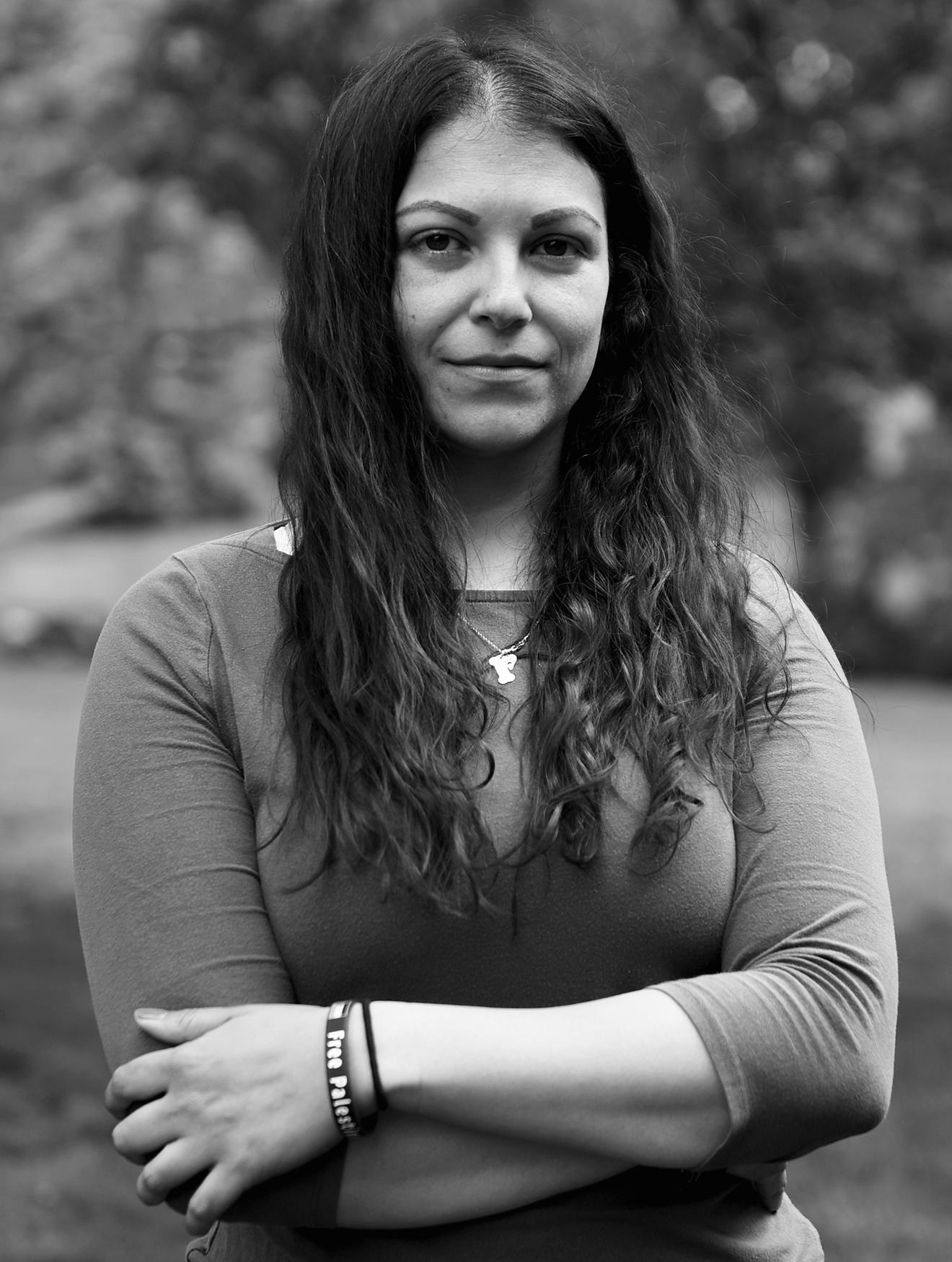
Poet and educator Cass Donish hasn’t always considered themself an activist. Their typical method of self-expression was through writing. Last fall, however, Donish was left grief-stricken and outraged by the bombing of Gaza and felt compelled to take action.
When Donish started to attend protests organized by Mizzou Students for Justice in Palestine, they noticed they were the only person there carrying a sign identifying themself as an anti-Zionist Jew. Other Jewish people approached Donish, which eventually led to the founding of CoMo Jews for Ceasefire.
“Something I’ve said again and again during this time is it’s exactly because of the oppression and violence that my Jewish ancestors experienced that I reject the idea that this violence has to happen for Jewish safety,” Donish says.
In the months since first organizing, Donish has done all they can to advocate for a cease-fire while also completing a doctorate in English and creative writing. Alongside Rachel English, they hosted a Chanukah for cease-fire event in December. In January, Donish drafted much of the city proclamation that Mayor Barbara Buffaloe signed calling for a cease-fire, the release of hostages and the unrestricted entry of humanitarian aid into Gaza.
“I really believe in collective liberation,” Donish says. “I think that queer and trans liberation are tied to Palestinian liberation and the liberation of all oppressed peoples, and I think that the path to that liberation is through community and love and solidarity.”
Columbia Jews for Ceasefire is a local organization seeking a cease-fire, peace and justice in Gaza. Check out comojews4ceasefire on Instagram.
Mizzou Students for Justice in Palestine is a student organization that seeks to raise awareness for the injustices committed against Palestinians. Search for msjp.mizzou on Instagram.
Your curated guide of what to do in Columbia this month.
Remember This: The Lesson of Jan Karski
This powerful one-man show is about the life of Polish resistance fighter Jan Karski and his struggle to help Polish Jews during WWII. Aaron Krawitz graces the stage in the Compass Listening Room for this production. The show is directed by Heather Hatton and features live music from Julie Rosenfeld and Lydia Redding. May 17-18, 7 p.m.; May 24-25, 7 p.m.; May 26, 2 p.m., Compass Reading Room, $20, 573-529-6563
Comedies in Concert
Laugh your chaps off at the Comedies in Concert performance from the University of Missouri Department of Theatre. A lineup of 10-minute plays celebrates all things country western to follow the summer season’s theme. Ten-gallon hats
and Cowboy Carter cred optional. June 4, 7 p.m., McKee Gymnasium Studio 4, $5, theatre.missouri. edu, 573-882-2021
Adventures in Nature: Stories in Photographs
Join photographer William Palmer as he shares his photography and tales from the outdoors. Palmer will lead a discussion on nature photography and outdoor exploration at the Columbia Public Library. See how photography can inspire appreciation for wildlife and conservation. An exhibition of his photographs will be at the library all summer. June 5, 6:30-7:30 p.m., Columbia Public Library, free, events.dbrl.org, 573-443-3161
Charlotte’s Web
Some pig! The University of Missouri Department of Theatre brings the classic children’s story

Charlotte’s Web to the stage as part of its Larry D. Clark Summer Repertory Theatre program. Watch as the power of true friendship changes the lives of Fern, Wilbur, Charlotte and all the farm animals in between. Group and family admission prices available. June 12-13 and 16, 2 p.m.; June 14-15, 11 a.m., McKee Gymnasium Studio 4, $15, theatre.missouri.edu, 573-882-2021
Craving a bit of Halloween in June? It’s time to do the time warp, then! The Blue Note will show the cult classic Rocky Horror Picture Show on its big screen for anyone over the age of 18. You can get your fill of yelling at Janet and Brad for the low price of $10. Costumes encouraged. June 22, 9 p.m., The Blue Note, $10, thebluenote.com, 573-874-1944
Princess Tea Party
Sip some tea and have a royally good time at the TRYPS Princess Tea Party. Eat sweet treats and collect autographs from your favorite princes and princesses in a complimentary autograph book. June 23, 1 p.m., Country Club of Missouri, $25, trypskids.com, 573-449-4536
Compost Workshop
Columbia’s free composting workshops continue at Capen Park. Get your hands dirty, meet new people and make the most out of food and yard waste. Register at como.gov/volunteer/volunteer-programs/ composting. June 8, 11 a.m. to noon, Capen Park, free, 573-874-6271
Breakfast Station Day
Rise and shine for free breakfast on breakfast station day. Breakfast starts at 7 a.m. at eight different locations around town. Grab a quick bite on your way to work or see how many you can get to in two hours. May 17, 7-9 a.m., free, lomocomo.org

The Missouri Symphony Orchestra’s Firefly Music Festival kicks off with a performance at Missouri Theatre June 22.
Preludes at the Pubs pairs musicians from The Missouri Symphony with local bars. The performance is free, but $10 donations are encouraged, so “brew” the right thing. May 29, 5:30-7:30 p.m., Logboat Brewing Co., free, themosy.org/event, 573-875-0600
Get in the summer spirit in downtown Rocheport while sipping wine, beer and spirits. This whistle-stop welcomes patrons to stroll its streets and visit local merchants. The rain or shine event starts at 4 p.m. Visitors get a commemorative wine glass with their ticket. June 15, 4-8 p.m., $25, rocheport-mo.com/events, 573-993-3101











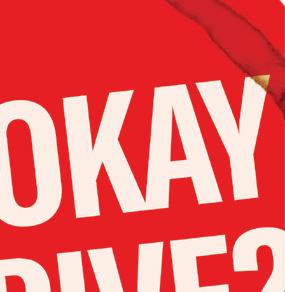

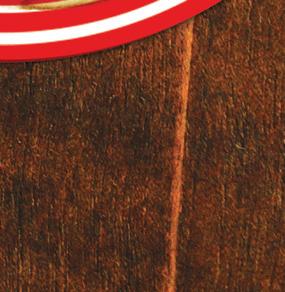







Join Cafe Berlin for a warm night with some of the Midwest’s finest singer-songwriters. Don’t miss Chris Canipe, Reshad Staitieh, David Korasick and Bill Schuh. June 1, 8 p.m., Cafe Berlin, $10, cafeberlincomo.com, 573-441-0400
For those feeling nostalgic, or looking to have a totally tubular Saturday evening, this dance party has you covered. Turn back time and join DJ Requiem for a night of getting jiggy to all your favorite ’80s and ’90s classics. June 15, 9 p.m., The Blue Note, $10; $20-$40 for box seats, theblue note.com, 573-874-1944
Kick off summer on the solstice with this city-wide event for local business owners and music enthusiasts alike. Make Music empowers musicians of all types and skill levels to perform at various venues throughout the day. Local businesses can host musicians, who’ll also be performing in parks and public spaces around town. June 21, all day, various locations throughout Columbia, free, makemusicday.org/columbiamo
Join The Missouri Symphony Orchestra to celebrate 200 years of Beethoven’s Symphony No. 9 as part of this opening concert of the Firefly Music Festival. After the orchestra performs Symphony No. 1, Columbia Choral and four solo artists will perform Symphony No. 9. June 22, 7 p.m., Missouri Theatre, $29-$49, themosy.org, 573-882-3781
Join Mayor Barbara Buffaloe at Flat Branch Park for a quick 1-mile walk. The Mayor’s Council on Physical Fitness and Health invites Columbia residents to walk a half mile down the Flat Branch trail and back for the inaugural Mayor’s Mile. Participants can register day of starting at 12:30 p.m. or online. May 19, 1 p.m., Flat Branch Park, free, lomocomo.org/event/mayors-mile
Continue the Juneteenth celebrations with your kids at Columbia Parks and Recreation’s Family Fun Fest. Columbia will be hosting Juneteenth celebrations June 19 at Cosmo Park, and the kidfriendly Juneteenth Jamboree will be the next day. June 20, 6-8 p.m., Cosmo Park, free, como.gov/ parks-and-recreation/special-events

Laura and her daughter, Carolee, tie-dye a shirt together during the first day of the 2023 Art in the Park festival. Carolee combined multiple colors to create a shirt for her mother. “That’s the crazy thing about this town,” Wilcoxon says. “Columbia has like 18 festivals happening at once.” Check out the 2024 Art in the Park on June 1 and 2 in Stephens Lake Park. The festival features artists from across the U.S., displaying a variety of media including painting, drawing, photography, pottery and more. Beginning in 1959, the free event is the oldest and largest fine arts festival in mid-Missouri.


